

How to say safe travels in chinese? A Guide For Tourists
Table of Contents
how to say safe travels in chinese? A guide for tourists
How To Say Safe Travels In Chinese? Absolutely, I understand your request. You’re looking for a detailed, value-packed listicle aimed at travelers, focusing on essential Chinese phrases to ensure a smooth and pleasant journey. This content will not only cover the basic “safe travels” sentiment but also extend to other useful phrases related to hotels, airlines, and various modes of transportation. Let’s dive into crafting a comprehensive guide that will be invaluable for travelers.
How to Say “Safe Travels” in Chinese & Other Essential Phrases for Travelers
Traveling to China or any Chinese-speaking region can be an exhilarating experience. The rich culture, breathtaking landscapes, and delicious cuisine await every traveler. To enhance your journey and navigate through various interactions smoothly, knowing a few key Chinese phrases can be incredibly helpful. Here’s a detailed guide to essential Chinese phrases for travelers, ensuring your travels are not only safe but also enjoyable.
1. Wishing Someone Safe Travels
- Safe Travels : “一路平安” (Yílù píng’ān) – This is the most common way to wish someone a safe journey. Literally translating to “may you have a smooth road,” it’s perfect for saying goodbye at the airport or when someone is embarking on a journey.
2. At The Airport
- Where is the check-in counter? : “请问登机牌发放处在哪里?” (Qǐngwèn dēngjīpái fāfàng chù zài nǎlǐ?) – Essential for finding where to begin your airport formalities.
- I need help with my luggage : “我需要帮助搬运我的行李” (Wǒ xūyào bāngzhù bānyùn wǒ de xínglǐ) – Useful if you’re carrying heavy bags or need assistance.
3. Hotels and Accommodations
- Do you have any rooms available? : “你们有空房间吗?” (Nǐmen yǒu kòng fángjiān ma?) – The first question to ask when checking for availability.
- I have a reservation : “我有预订” (Wǒ yǒu yùdìng) – Important for a smooth check-in process if you’ve booked in advance.
- Can I have the Wi-Fi password? : “可以给我Wi-Fi密码吗?” (Kěyǐ gěi wǒ Wi-Fi mìmǎ ma?) – Stay connected by asking for the Wi-Fi details as soon as you settle in.
4. Transportation Within the City
- How much is the fare? : “车费多少?” (Chēfèi duōshǎo?) – Whether you’re taking a taxi, bus, or any other form of transport, knowing how to inquire about the cost is crucial.
- Where is the subway station? : “请问地铁站在哪里?” (Qǐngwèn dìtiě zhàn zài nǎlǐ?) – An essential question for navigating cities efficiently.
- Can you take me to this address, please? : “请带我去这个地址,好吗?” (Qǐng dài wǒ qù zhège dìzhǐ, hǎo ma?) – Show the address to the driver and ask politely to be taken there.
5. Dining Out
- Do you have a menu in English? : “你们有英文菜单吗?” (Nǐmen yǒu Yīngwén càidān ma?) – Helpful for understanding what’s on offer if you’re not familiar with Chinese cuisine.
- I am allergic to… : “我对…过敏” (Wǒ duì… guòmǐn) – Essential for anyone with food allergies to ensure your dining experiences are safe.
- Can I have the bill, please? : “请给我账单” (Qǐng gěi wǒ zhàngdān) – The polite way to ask for your bill after a meal.
6. Emergency Phrases
- Help! : “救命!” (Jiùmìng!) – A critical phrase in any language, hopefully one you won’t need.
- Where is the hospital? : “医院在哪里?” (Yīyuàn zài nǎlǐ?) – Important in case of a medical emergency.
- I lost my passport : “我丢了我的护照” (Wǒ diūle wǒ de hùzh
ào) – Vital for seeking assistance if you misplace your passport.
7. Making Connections
- Do you speak English? : “你会说英语吗?” (Nǐ huì shuō Yīngyǔ ma?) – A good starting point for finding someone who can help with language barriers.
- Thank you : “谢谢” (Xièxiè) – Never underestimate the power of a thank you in any culture.
- I’m sorry : “对不起” (Duìbùqǐ) – An important phrase for apologizing, whether you bump into someone accidentally or need to excuse yourself.
By equipping yourself with these phrases, you’re not only enhancing your travel experience but also showing respect for the local culture and language. Safe travels, or as you now know, “一路平安” (Yílù píng’ān)!
8. Exploring the City
- Can you recommend a sightseeing spot? – 你能推荐一个观光地点吗?(Nǐ néng tuījiàn yí gè guānguāng dìdiǎn ma?) A great way to discover popular or hidden gems in the area.
9. Shopping
- How much does this cost? – 这个多少钱?(Zhège duōshǎo qián?) Essential for any shopping experience, whether at a market or a store.
10. Local Cuisine
- What is a traditional dish here? – 这里有什么传统菜?(Zhèlǐ yǒu shénme chuántǒng cài?) Dive into the local cuisine with traditional dishes recommended by locals.
11. Cultural Etiquette
- Is it customary to tip here? – 这里习惯给小费吗?(Zhèlǐ xíguàn gěi xiǎofèi ma?) Understand the local customs regarding tipping to avoid any faux pas.
12. Transportation Queries
- When is the next train/bus? – 下一班火车/公交车什么时候?(Xià yī bān huǒchē/gōngjiāochē shénme shíhou?) Keep your travel plans on schedule by knowing the timings of public transport.
13. Booking and Reservations
- Can I book a ticket to…? – 我可以预订一张去…的票吗?(Wǒ kěyǐ yùdìng yì zhāng qù… de piào ma?) Useful for making reservations for trains, buses, attractions, and performances.
14. Directions and Addresses
- I’m looking for this address. – 我在找这个地址。(Wǒ zài zhǎo zhège dìzhǐ.) Helpful when seeking directions to a specific location.
15. Language Assistance
- Can you write that down for me? – 你可以写下来给我吗?(Nǐ kěyǐ xiě xiàlái gěi wǒ ma?) Useful for getting directions or recommendations in writing, especially if you’re struggling with pronunciation.
16. At the Pharmacy
- Do I need a prescription for this? – 这个需要处方吗?(Zhège xūyào chǔfāng ma?) Important when purchasing medication at a pharmacy.
17. Experiencing Nature
- Where is the nearest hiking trail? – 最近的徒步道在哪里?(Zuìjìn de túbù dào zài nǎlǐ?) For those looking to explore the natural landscapes.
18. Socializing
- Would you like to have dinner with me? – 你愿意和我一起吃晚饭吗?(Nǐ yuànyì hé wǒ yìqǐ chī wǎnfàn ma?) A friendly way to invite someone out and enjoy the local dining scene together.
19. Handling Money
- Where can I exchange money? – 我在哪里可以兑换货币?(Wǒ zài nǎlǐ kěyǐ duìhuàn huòbì?) Crucial for ensuring you have the local currency for small expenses.
20. Cultural Experiences
- What time does the show start? – 演出什么时候开始?(Yǎnchū shénme shíhou kāishǐ?) Engage with local art and culture by attending live performances or shows.
21. Health Concerns
- I feel sick. – 我感觉不舒服。(Wǒ gǎnjué bù shūfú.) Expressing discomfort or sickness is vital in seeking help or medical attention.
- Is this area safe at night? – 这个区
域晚上安全吗?(Zhège qūyù wǎnshàng ānquán ma?)
Ensure your evening adventures are both enjoyable and safe.
23. Connectivity
- How do I connect to the Wi-Fi? – 我怎么连接Wi-Fi?(Wǒ zěnme liánjiē Wi-Fi?) Staying connected is essential for both navigation and keeping in touch.
24. Feedback and Complaints
- I would like to make a complaint. – 我想要投诉。(Wǒ xiǎng yào tóusù.) Sometimes, it’s necessary to express dissatisfaction with services or accommodations.
25. Special Requests
- Can this be made less spicy? – 这个能做得不那么辣吗?(Zhège néng zuò dé bù nàme là ma?) Tailor your dining experience to your taste preferences.
26. Gratitude and Appreciation
- I’ve enjoyed my stay here. – 我很享受在这里的时光。(Wǒ hěn xiǎngshòu zài zhèlǐ de shíguāng.) Show your appreciation for hospitality and service.
27. Time and Schedules
- What time is it? – 现在几点了?(Xiànzài jǐ diǎn le?) Keeping track of time is essential, especially when catching flights or attending scheduled events.
28. Dietary Preferences
- I’m vegetarian. – 我是素食者。(Wǒ shì sùshí zhě.) Communicate your dietary restrictions clearly to avoid any misunderstandings.
29. Asking for Recommendations
- What’s your favorite restaurant here? – 你最喜欢这里的哪家餐厅?(Nǐ zuì xǐhuān zhèlǐ de nǎ jiā cāntīng?) Locals can offer the best dining suggestions, leading you to culinary delights you might otherwise miss.
30. Farewells
- I hope to come back again. – 我希望能再回来。(Wǒ xīwàng néng zài huílái.) A heartfelt goodbye, expressing your desire to return, fosters goodwill and ends your visit on a positive note.
This expanded list of 30 essential Chinese phrases covers a broad range of situations, making your travels through China or any Chinese-speaking region smoother and more enjoyable. Remember, a little language preparation goes a long way in enhancing your travel experience and creating meaningful interactions. Safe travels, or as you now know, “一路平安” (Yílù píng’ān)!
This comprehensive list covers the essentials that every traveler to a Chinese-speaking region should know. By familiarizing yourself with these phrases, you can navigate airports, hotels, transportation, dining, and even emergencies with greater ease. Not only does this knowledge facilitate smoother interactions, but it also enriches your travel experience, opening doors to more authentic experiences and connections.
For More Info : https://travel.state.gov/content/travel.html
Speak with Confidence
How to Say “Have a Safe Flight” in Chinese
Chinese is one of the most widely spoken languages in the world, with different regions and dialects that may have variations in how certain phrases are expressed. When it comes to saying “have a safe flight” in Chinese, there are both formal and informal ways to convey this wish. In this guide, we will explore various ways to express this phrase, providing tips, examples, and even a few regional variations.
Table of Contents
Formal Expressions:
In formal settings, it is important to use the appropriate level of respect when expressing your wishes for a safe flight. Here are some formal expressions commonly used in Chinese:
1. 一路平安 (yí lù píng ān)
This is a common and widely used Mandarin Chinese expression to wish someone a safe journey. It directly translates to “have a safe journey” and can be used in various contexts, including when someone is about to take a flight. It is a simple yet powerful phrase that conveys your genuine concern for their well-being during their travel.
“I heard you have a flight tomorrow. 一路平安!” Translation: “I heard you have a flight tomorrow. Have a safe journey!”
2. 保重 (bǎo zhòng)
While this expression literally means “take care of yourself,” it can also be used to wish someone a safe trip, including when they are about to board a flight. Although it is not as specific as “have a safe flight,” it still serves the purpose of conveying your well-wishes for their overall safety. This phrase is commonly used among friends and acquaintances.
“Bon voyage! Remember to take care of yourself. 保重!” Translation: “Bon voyage! Remember to take care of yourself. Take care!”
Informal Expressions:
When you are close with someone or in a more casual setting, you can use informal expressions to wish them a safe flight. Here are a couple of examples:
1. 一路顺风 (yí lù shùn fēng)
This informal phrase translates directly to “have a smooth journey” and is often used among friends and family members. It is a warm and friendly way to express your wishes for their safe and smooth travels. This expression is particularly popular in Mainland China.
“Text me once you arrive safely! 一路顺风!” Translation: “Text me once you arrive safely! Have a smooth journey!”
2. 旅途愉快 (lǚ tú yú kuài)
This informal expression translates to “have a pleasant journey” and can be used to wish someone well before their flight. It is a versatile phrase that can be used not only for flights but also for other types of travel. It carries a positive and cheerful tone.
“Enjoy your trip! 旅途愉快!” Translation: “Enjoy your trip! Have a pleasant journey!”
Regional Variations:
While Mandarin Chinese is the most widely spoken form of Chinese, there are also regional variations in how people express “have a safe flight.” The following examples showcase some regional variations:
1. 平平安安 (píng píng ān ān) – Southern China
In Southern China, especially in Guangdong Province, locals often use this phrase to convey the wish for a safe and peaceful journey. It is more commonly used in informal settings among friends and family.
“Take care and have a safe trip, my friend. 平平安安!”
2. 一路顺行 (yí lù shùn xíng) – Taiwan
In Taiwan, people often use this phrase to wish others a smooth journey as they embark on their travels. It is similar to “一路顺风” but carries a slightly different nuance.
“Wishing you a smooth journey and exciting adventures! 一路顺行!”
Remember, regardless of the specific expression you choose, the most important thing is to convey your genuine care and concern for the person’s well-being during their flight. It’s the thought and warmth behind the words that truly matter. Now, armed with these phrases, you can confidently wish someone a safe flight in Chinese!
Related Guides:
- Guide on How to Say “Safe Flight” in Chinese
- Guide: How to Say “Have a Safe Flight Back Home”
- How to Say “Have a Safe Flight Home”: Formal and Informal Ways
- How to Say “Have a Safe Flight” in Hebrew
- How to Say “Have a Safe Flight” in Islam – A Guide with Tips and Examples
- How to Say “Have a Safe Flight” to Your Boyfriend
- How to Say “Safe Flight” in Korean: Your Complete Guide
- Guide: How to Say “Safe Flight” in Mandarin
About The Author
Erica Claudia
Chinese Phrase - Have a safe journey
- Introduction (10)
- Extended (17)
- Responses (8)
- Farewells (24)
- Booking (10)
- Beverages (2)
- Phrases (6)
- In The Airport (11)
- In The Airplane (5)
- Time Schedule (3)
- Customs (5)
- Asking Directions (45)
- Tickets (6)
- Vocabulary (7)
- Finding Accommodation (22)
- Booking (20)
- Requests and Queries (17)
- Checking in (2)
- Checking out (1)
- Vocabulary (33)
- Animals (4)
- Family (20)
- Numbers (5)
- Weekdays (7)
- Month Names (12)
- Seasons of the Year (4)
- Intervals (4)
- Questions (5)
- Countries (4)
- Cities in China (4)
- Medical (10)
- Professions (1)
- Prepositions (4)
- Bargaining (10)
- Going to the bathroom (4)
- When kids go (4)
- Currency (17)
- Exchanging (13)
- Paying (19)
- Fees and Charges (10)
- Banking (10)
- Languages (2)
- Conversation (9)
- Dating (27)
- Culturally Important (2)
- Distances (4)
- Wishing and Blessing (10)
- Learning Chinese (15)
- Nationality (10)
- Forms of Address (4)
- Idioms - Chengyu (21)
- Various Goodies (5)
- Business Relations (1)
- Survival (14)
Have a safe journey
Yílù píngān, learn how to say the chinese phrase for have a safe journey with standard mandarin pronunciation. free mandarin phrases with pinyin and literal translation, follow standard mandarin.
You are using an outdated browser. Please upgrade your browser or activate Google Chrome Frame to improve your experience.
Chinese for Travel: 30 Useful Mandarin Phrases for Your Journey
Are you currently in or planning on traveling to China?
Then you’ve come to the right place.
This post will provide you with the most helpful travel phrases in Chinese to ensure a smooth 旅游 (lǚ yóu) — trip.
Here are 30 useful phrases that you should know for your travels, or 旅行 (lǚ xíng) , when in China!
In the Airport
Taking a taxi, busses and trains, at the hotel, asking for directions, tips for using chinese travel phrases , and one more thing....
Download: This blog post is available as a convenient and portable PDF that you can take anywhere. Click here to get a copy. (Download)
1. 登机手续柜台在哪里?
Pinyin: dēng jī shǒu xù guì tái zài nǎ li? English: Where is the check-in counter?
To name the specific check-in counter, add any of these words to the beginning of the phrase:
经济舱 (jīng jì cāng) — Economy Class 公务舱 (gōng wù cāng) — Business Class 头等舱 (tóu děng cāng) — First Class
2. __号登机口往哪边走 ?
Pinyin: __ hào dēng jī kŏu wăng nă biān zŏu? English: Which way is boarding gate number __?
3. 请帮我安排靠窗户的座位 。
Pinyin: qǐng bāng wǒ ān pái kào chuāng hù de zuò wèi. English: Please arrange a window seat for me.
4. 请帮我安排靠走廊的座位 。
Pinyin: qǐng bāng wǒ ān pái kào zŏu láng de zuò wèi. English: Please arrange an aisle seat for me.
5. 我现在到起飞的时间还有多久 ?
Pinyin: wǒ xiàn zài dào qǐ fēi de shí jiān hái yǒu duō jiǔ? English: How long do I have until departure time?
5. 的士站在哪儿 ?
Pinyin: di shì zhàn zài nǎ ér? English: Where is the taxi stand?
Pinyin: nǐ qù nǎ ér? English: Where do you want to go?
7. 这儿 , 知道吗 ?
Pinyin: zhè ér, zhī dào ma? English: Here. Do you know where that is?
Pinyin: zhī dào. English: I know [where that is].
Pinyin: bù zhī dào. English: I don’t know [where that is].
Pinyin: duō shǎo qián? English: How much?
Pinyin: zhè ér tíng chē. English: You can stop here.
12. __号到这儿吗 ?
Pinyin: __ hào dào zhè ér ma? English: Is this the stop for the __ route/line?
13. 谢谢你帮我 。
Pinyin: xiè xiè nǐ bāng wǒ. English: Thank you for helping me.
14. 地铁站在哪儿 ?
Pinyin: dì tiě zhàn zài nǎ ér? English: Where is the subway station?
15 . 在哪里买票 ?
Pinyin: zài nǎ lǐ mǎi piào? English: Where can I buy a ticket?
16. 公交车站在哪儿 ?
Pinyin: gōng jiāo chē zhàn zài nǎ ér? English: Where is the bus stop?
Pinyin: jǐ zhàn? English: How many stops?
18. 需要转车吗 ?
Pinyin: xū yào zhuǎn chē ma? English: Do I have to transfer?
19. 我预订了两间___ 。
Pinyin: wǒ yù dìng le liǎng jiān ___. English: I have made a reservation for two ___ rooms.
You can obviously replace the number of rooms with however many you booked. To indicate the type of room, fill in the blank with one of the following:
标准房 (biāo zhǔn fáng) — Standard room 套房 (tào fáng) — Suite
20. 我想要___房 。
Pinyin: wǒ xiǎng yào ___ fáng. English: I want a ___ room.
To say the type of room you’d like, fill in the blank with:
单人 (dān rén) — Single room 双人 (shuāng rén) — Double room
21. 电梯在哪儿 ?
Pinyin: diàn tī zài nǎ ér? English: Where is the elevator?
22. 我们现在要退房了 。
Pinyin: wǒ men xiàn zài yào tuì fáng le. English: We’re going to check out now.
23. 去___怎么走 ?
Pinyin: qù ___ zěn me zǒu? English: How do I get to ___?
24. 下车的时候 ,___ 。
Pinyin: xià chē de shí hou, ___. English: When you get off, ___.
25. 出去的时候 ,___ 。
Pinyin: chū qù de shí hou, ___. English: When you exit, ___.
Pinyin: zǔo English: Left
Pinyin: yòu English: Right
Pinyin: huí qù English: Go back
Pinyin: yī zhī zǒu English: Go straight
30. 你看___的时候 ,___ 。
Pinyin: nǐ kàn ___ de shí hou, ___. English: When you see ___, ___.
- Pronunciation is way more important than grammar. If you’re concerned about how to structure your “How do I get there?” question, forget it. Pronouncing the name of the place you’re going to is enough to get you there.
FluentU takes authentic videos—like music videos, movie trailers, news and inspiring talks—and turns them into personalized language learning lessons.
You can try FluentU for free for 2 weeks. Check out the website or download the iOS app or Android app.
P.S. Click here to take advantage of our current sale! (Expires at the end of this month.)

Try FluentU for FREE!
- Complete sentences are often not necessary in conversation.
- Learn the names of a few landmarks that are close to where you’re staying. Banks, parks, intersections, restaurants, grocery stores, convenience stores, shopping malls, hotels and schools can all serve as points of identification.
- Ask the bus driver if they pass your destination before you get on the bus.
- Don’t be afraid to ask for help. Most people are happy to be of assistance.
- Download an app or e-Book for travel phrases. This way you have a reference to help you out when you forget how to say something.
- Record the phrases as voice notes. Not only is this great for pronunciation practice, but it’s also extremely helpful as backup, in case the nerves get to you in the heat of the moment and cause you to say the phrases incorrectly.
Now you have all the Mandarin Chinese travel phrases you need to get around. Use them as much as you can and enjoy your trip!
If you want to continue learning Chinese with interactive and authentic Chinese content, then you'll love FluentU .
FluentU naturally eases you into learning Chinese language. Native Chinese content comes within reach, and you'll learn Chinese as it's spoken in real life.
FluentU has a wide range of contemporary videos—like dramas, TV shows, commercials and music videos.

FluentU App Browse Screen
FluentU brings these native Chinese videos within reach via interactive captions. You can tap on any word to instantly look it up. All words have carefully written definitions and examples that will help you understand how a word is used. Tap to add words you'd like to review to a vocab list.

Interactive Transcripts on FluentU
FluentU's Learn Mode turns every video into a language learning lesson. You can always swipe left or right to see more examples for the word you're learning.

FluentU Has Quizzes for Every Video
The best part is that FluentU always keeps track of your vocabulary. It customizes quizzes to focus on areas that need attention and reminds you when it’s time to review what you’ve learned. You have a 100% personalized experience.
Start using the FluentU website on your computer or tablet or, better yet, download the FluentU app from the iTunes or Google Play store. Click here to take advantage of our current sale! (Expires at the end of this month.)
Enter your e-mail address to get your free PDF!
We hate SPAM and promise to keep your email address safe

China Travel Restrictions & Travel Advisory (Updated June 17, 2024)
Visa-Free Access to China : If you're from France, Germany, Italy, the Netherlands, Spain, Austria, Belgium, Hungary, Ireland, Luxembourg, Switzerland, and Malaysia, you can visit China visa-free for 15 days until December 31st, 2025. If you're from Singapore, you can relish visa-free access to China for up to 30 days. New Zealand and Australia will also be added to China's 15-day visa-free list.
If your nationality isn't listed above or if you aim to discover China for more than two weeks, we offer a Port Visa Service for just US$50 per person (valid until June 30th, 2024) once your tour booking is confirmed with us. No stress of embassy visits and visa interviews.
Content Preview
- What Ways to Enter China
- Do I Still Need a PCR Test to Enter China
- Hong Kong/Macau Travel Restriction
International Flights to China
What to expect when traveling in china, best times to travel to china, 8 ways to enter china: all open now.
Since China has fully permitted visa applications, there are now several ways to enter the country.
If you still hold a valid Chinese visa (any type including a tourist visa, 10-year visa, a port visa, etc.), you can use it to enter China.
If you don't have a Chinese visa or your visa has expired, you can apply for a new one. All visas can now be applied for, including tourist visas, business visas, work visas, and so on. (International visitors can apply for a tourist visa to the Chinese Mainland in Hong Kong.)
For the documents required for a visa application, you can refer to the information given by a Chinese embassy/consulate . Please submit your application at least two months in advance.
To apply for a tourist visa (L visa), you will be asked to provide an invitation letter issued by a Chinese travel agency or individual or round-trip air tickets and hotel bookings.
When booking a private tour with us, we can provide you with an invitation letter, which is one more thing we do to make your travel more convenient, giving you more flexibility with your air tickets and hotel bookings.
Now it is very easy to apply for a visa . You can easily apply by yourself without an intermediary. The following is how one of our clients successfully applied for a Chinese tourist visa:
- First, fill out the form at the China Online Visa Application website ;
- Second, make an appointment on this website to submit your visa materials on Appointment for Visa Application Submission website ;
- Third, take the required documents to the embassy to submit;
- Finally, you will get a return receipt if your documents are qualified.
Usually, you will get your visa after 7 working days. The application fee is about USD185 for US citizens.
Q: What if my passport expires but my visa doesn't?
A: You can travel to China on the expired passport containing valid Chinese visa in combination with the new passport, provided that the identity information (name, date of birth, gender, nationality) on both passport identical.
If there is a change to any of the above details, you must apply for a new visa.
2. 144-Hour Visa-Free Transit Policy
If you do not apply for a Chinese visa, you may still have the opportunity to visit these areas of China visa free: the Shanghai area (including Suzhou, Hangzhou, etc.), the Beijing area (with Tianjin and Hebei), the Guangzhou area (Shenzhen, Zhuhai, etc.), and more. Take advantage of the 6-day visa-free entitlements.
Find out if you could use the 144-hour visa-free transit policy with our information on China's 144-hour Visa-Free Policy (Eligible Entry/Exit Ports, Applicable Countries, Documents to be Prepared...)
You can also obtain entry and exit control policies through the 24-hour hotline of the National Immigration Administration:
- Beijing: 0086 (+86)-10-12367
- Shanghai: 0086 (+86)-21-12367
- Guangzhou: 0086 (+86)-20-12367
Quick Test: Will My Route Qualify for China 72/144-Hour Visa-Free Transit?
1. I will depart from (only applies to direct or connected flight):
2. I will arrive in China at [city], [airport / railway station / port].
3. My arrival date is...
4. I will leave for [country/region] from China (the bounding destination on the air ticket):
5. My departure date is...
6. My nationality is...
8. I have Chinese visa refusal stamps in my passport.
You qualify to enjoy China's 72-hour visa-free policy.
You qualify to enjoy China's 144-hour visa-free policy.
You don't qualify to enjoy China's 72-hour or 144-hour visa-free policy.
Reason you don't qualify:
- You must be in transit to a third country or region.
- You must leave the city area (prefecture or municipality) after the 72/144 hours (the 72/144-hour limit is calculated starting from 00:00 on the day after arrival, i.e. 24:00 on the arrival date).
- Your passport must be valid for more than 3 months at the time of entry into China.
- Your passport nationality is not eligible for the 72/144-hour visa exemption program.
- You have Chinese visa refusal stamps in your passport.
3. Port Visas (Landing Visas)
If you don't have time to get a visa, or if you find it cumbersome to apply for a tourist visa, you could consider traveling to China through a port visa.
Port visas can be applied for a group at least including 2 people. You need to enter the country within 15 days after you get your entry permit. The port visa allows a stay period of 1 to 2 months.
Applicable ports include Beijing, Shanghai, Hangzhou, Guangzhou, Xiamen, Guilin, Xi'an, Chengdu, etc.
Note: Tourists from America are not granted a port visa in Shanghai.
Book your China trip with us and we can help you apply for a port visa.
4. Visa Exemption for ASEAN Tour Groups to Guilin
In addition, tour groups from ASEAN member countries, including Malaysia, Thailand, Indonesia, Vietnam, Cambodia, Laos, Singapore, Myanmar, Brunei, and the Philippines, can visit Guilin for 144 hours without visas as long as they meet the visa-free transit policy requirements.
5. Shanghai Visa-Free Policy for Cruise Groups
Shanghai has a 15-day visa-free policy for foreign tourist groups entering China via a cruise. You must arrive and depart on the same cruise and be received by a Chinese travel agent at the Shanghai Cruise Terminal (or Wusong Passenger Center).
6. Hainan Visa-Free Access
No visa is required for staying on Hainan Island for up to 30 days for ordinary passport holders from 59 countries. Groups and individual tourists must book a tour through an accredited travel agency.
Find out whether you qualify for the policy here .
7. Visa Exemption for the Pearl River Delta Area
International travelers from Hong Kong or Macau are able to visit the Pearl River Delta area (Guangzhou, Shenzhen, Zhuhai, etc.) visa-free as long as they go with a registered tour provider, such as us.
8. APEC Cards
If you hold a valid APEC business travel card, you can simply enter China with the card without applying for a visa.
Travelers who hold a valid APEC business travel card can stay in China for up to 60 days.
- 4-Day Beijing Private Tour - Essence of Beijing
- 11-Day Beijing–Xi'an–Guilin–Shanghai Tour - Classic Wonders
- 13-Day Beijing, Xi'an, Chengdu, Shanghai Educational Family Vacation
Do I Still Need a PCR Test or Antigen Self-Test to Enter China
No. Starting from August 30, all travelers entering China will no longer need to undergo any COVID-19 testing. You do not need to submit any test results for COVID-19 before departure.
- 8-Day Beijing–Xi'an–Shanghai Private Tour - China Golden Triangle
- 13-Day Riches of China - Beijing – Xi'an – Guilin/Yangshuo – Hangzhou - Suzhou – Shanghai
Hong Kong / Macau Travel Restriction
Hong kong entry requirements.
Travelers from any region bound for Hong Kong will no longer need to take pre-flight COVID-19 tests (no PCR test, no RAT test) from April 1.
There is also no need for any tests when traveling from Hong Kong to the Chinese Mainland. Hong Kong could be a good gateway for your China trip. See suggestions on China Itineraries from Hong Kong (from 1 Week to 3 Weeks).
Direct high-speed trains from Guangzhou and Shenzhen to Hong Kong are available now. In preparation for the Canton Fair, it is expected that direct high-speed ferries will be launched from Guangzhou Pazhou Port to Hong Kong's airport in mid-April.
- 10 Top China Tours from Hong Kong
Macau Entry Requirement
From August 30, travelers from any region bound for Macau will no longer need to take pre-flight COVID-19 tests (no PCR test, no RAT test).
There is also no need for any tests when traveling from Macau to the Chinese Mainland.
Inbound and outbound international flights in the week beginning March 6th rose by more than 350% compared with a year earlier, to nearly 2,500 flights, according to Chinese flight tracking data from APP Flight Master.
At present, there are one or two direct flights a week from New York to Shanghai, Los Angeles to Beijing, Seattle to Shanghai, London to Guangzhou, etc.
There are also many flight options with stopovers that are more frequent and affordable. Testing at transit airports is now not required!
The Coronavirus outbreak in China has subsided. China looks like it did in 2019 again. No special measures (like PCR tests or health codes) are required when traveling around China. All attractions are open as normal.
Wearing a mask is not mandatory when traveling. In hotels, masks are off for the most part. But in some crowded places, such as airports or subway stations, many people still wear masks.
Weather-wise, the best times to visit China are spring (April–May) and autumn (September–October), when most of the popular places have their most tourism-friendly weather, except for the "golden weeks" — the first week of May and of October — when most attractions are flooded with Chinese tourists.
If you are looking for smaller crowds, favorable prices, and still good weather, you should consider March and April or September.
Tourism in cultural and historical destinations like Beijing, Shanghai, and Xi'an is hardly affected by weather conditions. They are suitable to be visited all year round.
- 11-Day Family Happiness - Beijing–Xi'an–Guilin/Yangshuo-Shanghai
- 13-Day Private Tour: Beijing – Xi'an – Chengdu –Yangtze Cruise – Shanghai - China Essence and Panda Tour
- More Chengdu and Panda tours
Discover real reviews of Highlights Travel Family 's best-rated service across trusted platforms.
Tour China with Us
We've been building our team for over 20 years. Even over the past three years we have continued, serving over 10,000 expats with China tours and getting a lot of praise (see TripAdvisor ).
We are based in China and can show you the characteristics and charm of China from a unique perspective. Just contact us to create your China trip .
Our consultants will listen to and answer your inquiries carefully and prepare the best plan for you.
- 8-Day Beijing–Xi'an–Shanghai Highlights Tour — the classic Golden Triangle
- 11-Day Beijing–Xi'an–Guilin–Shanghai — our top itinerary for families
- 2-Week Beijing – Xi'an – Chengdu – Yangtze Cruise – Shanghai Tour — the best choice for panda fans
- 14-Day China Natural Wonders Discovery
- 9-Day Beyond the Golden Triangle
- 2-Week Riches of China
- 15 Best Places to Visit in China (2024)
- Best (& Worst) Times to Visit China, Travel Tips (2024/2025)
- How to Plan a 10-Day Itinerary in China (Best 5 Options)
- 8 Days in China: Top 15 Tours and Itineraries (2024/2025)
- China Weather in January 2024: Enjoy Less-Crowded Traveling
- China Weather in February 2024: Places to Go, Costs, and Crowds
- China Weather in March 2024: Destinations, Crowds, and Costs
- China Weather in April 2024: Where to Go (Smart Pre-Season Pick)
- China Weather in May 2024: Where to Go, Crowds, and Costs
- China Weather in June 2024: How to Benefit from the Rainy Season
- China Weather in July 2024: How to Avoid Heat and Crowds
- China Weather in August 2024: Weather Tips & Where to Go
- China Weather in September 2024: Weather Tips & Where to Go
- China Weather in October 2024: Where to Go, Crowds, and Costs
- China Weather in November 2024: Places to Go & Crowds
- China Weather in December 2024: Places to Go and Crowds
Get Inspired with Some Popular Itineraries
More travel ideas and inspiration, sign up to our newsletter.
Be the first to receive exciting updates, exclusive promotions, and valuable travel tips from our team of experts.
Why China Highlights
Where can we take you today.
- Southeast Asia
- Japan, South Korea
- India, Nepal, Bhutan, and Sri lanka
- Central Asia
- Middle East
- African Safari
- Travel Agents
- Loyalty & Referral Program
- Privacy Policy
Address: Building 6, Chuangyi Business Park, 70 Qilidian Road, Guilin, Guangxi, 541004, China
Wishing Someone a Safe Flight in Chinese
When travelling, sending well wishes to friends and family can provide a sense of comfort during a time of uncertainty. In China, the phrase to wish someone a safe flight is a common one. Knowing the proper way to say this expression can not only help to show respect to Chinese culture, but it can also be beneficial to travelers seeking to master the language.
The phrase to wish someone a safe flight in Chinese is “Nín hǎo yí bēi,” which translates to “Have a safe trip.” This phrase is used to wish someone a safe flight, and can be used for anyone who is planning a long journey, whether it is by car, train, or plane. This phrase can be used by someone who is about to embark on a trip, as well as by someone who is wishing them farewell.

When using this phrase, it is important to pay attention to the tone and intonation used when saying it. In Chinese, the phrase can be said in a variety of ways, depending on the context. For example, if the phrase is being said to someone who is going on a long journey, it is usually said with a more serious and respectful tone. On the other hand, if the phrase is being said to someone who is going on a shorter journey, it can be said in a more cheerful and lighthearted tone.
When saying “Nín hǎo yí bēi,” it is also important to remember to use proper body language. When saying this phrase to someone who is going on a trip, it is polite to bow slightly while saying the phrase. This shows respect and gratitude towards the person who is embarking on their journey.
Overall, knowing how to say “Nín hǎo yí bēi” (“Have a safe trip”) in Chinese is an important phrase to have in one’s repertoire. This phrase can be used to wish someone a safe flight, and is often said with a respectful and grateful tone. By mastering this phrase, travelers can show respect to Chinese culture while also understanding the proper way to say this phrase.
Leave a Comment Cancel Reply
Your email address will not be published. Required fields are marked *
Save my name, email, and website in this browser for the next time I comment.
Your Best Guide to China
Visiting China soon? Start here

- Best China VPN
- Chinese culture
- Banned apps
- Apps in China
- Love in China
- Teach in China
- Provinces and regions
- Special offers
- 6 steps to get started
- Best places to visit in China
- What to bring to China
- What not to bring to China
- China packing list
- Tips for your first trip
- Tips for solo travel

Top 16 do’s and don’ts of texting Chinese girls
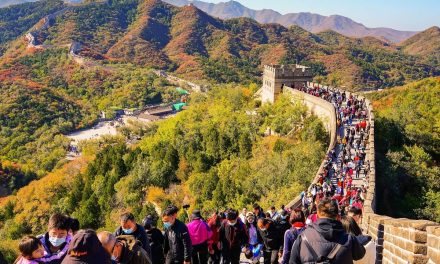
Best time to visit the Great Wall of China (2024)
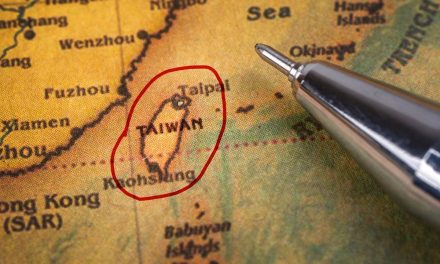
What are the main differences between China and Taiwan?
- Travel agencies
- Learn Chinese in China
- Learn Chinese online
- Study programs
- Internships
- Recruitment agencies
- Teacher recruitment agencies
- TEFL courses
- Volunteer programs
- Dating sites
- Travel insurance
Select Page
What every American traveling to China in 2024 needs to know
Posted by Mike Cairnduff | Updated December 14, 2023 | China blog , Travel
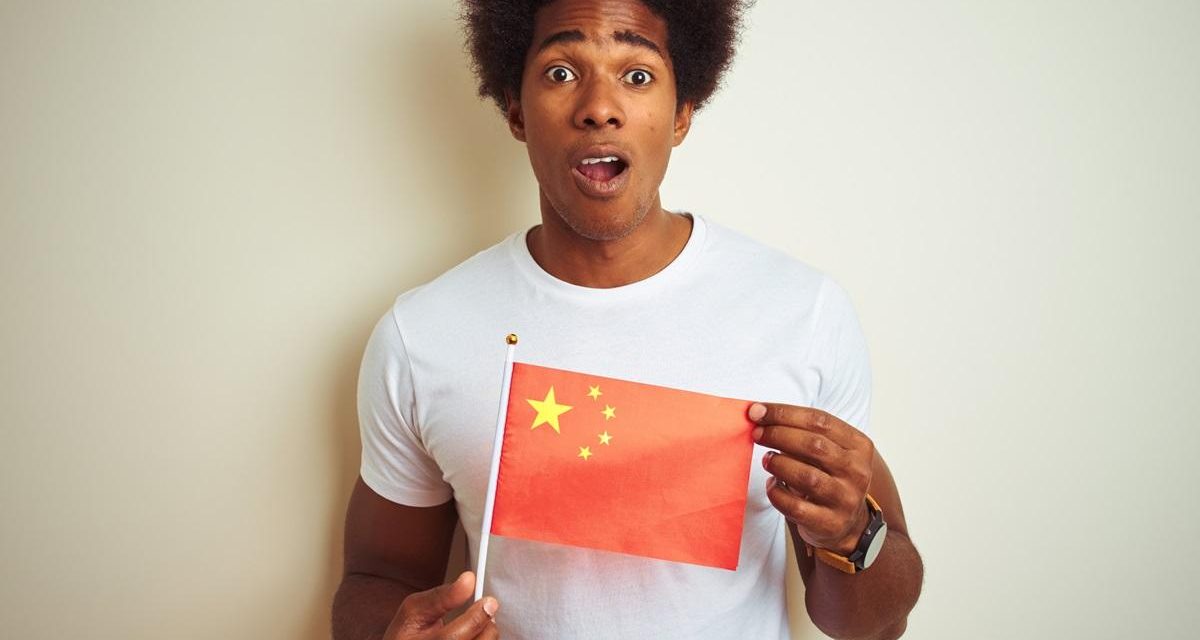
OK, so you’re American and you’re traveling to China.
Firstly, congratulations! That is so exciting.
Having spent loads of time in China myself, I’m pleased to be able to share my best tips with you so that you can feel more confident and organized.
These are all the main things you should consider before jumping on the plane.
Not from the US? You may still find this article helpful but I’d suggest referring to my mega China travel tips page for more details.
1. Don’t tip
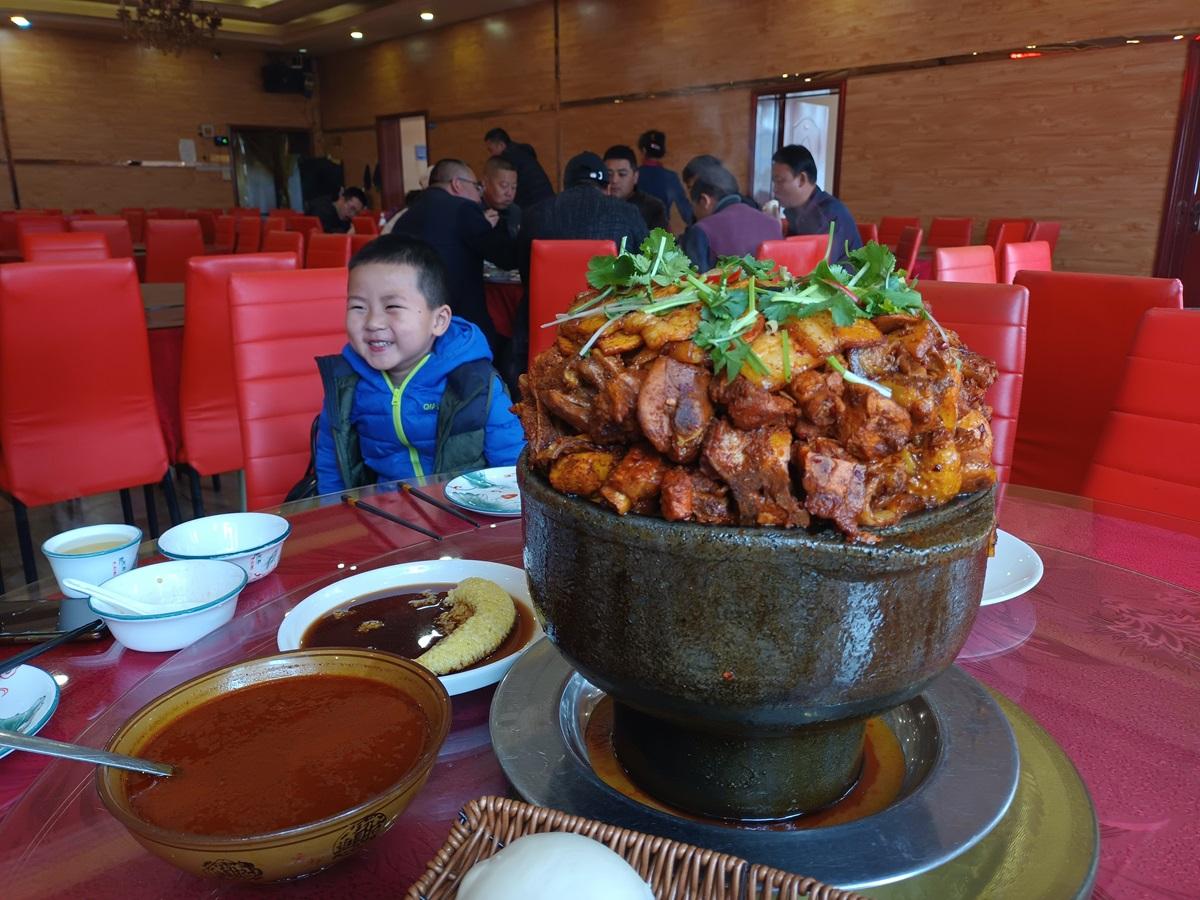
Great meal in China? Don’t tip. Image supplied by Mike Cairnduff.
My first tip – don’t tip.
The Chinese don’t tip, and neither should you. It might feel strange at first, but you’ll get used to it.
There are some exceptions to the rule, for instance if you receive amazing service at a luxury hotel, but generally you can keep your purse closed for your entire trip.
If you want to hear my personal stories about tipping in China, or you want more information about the exceptions, visit this page on China tipping .
2. Shop around for flights
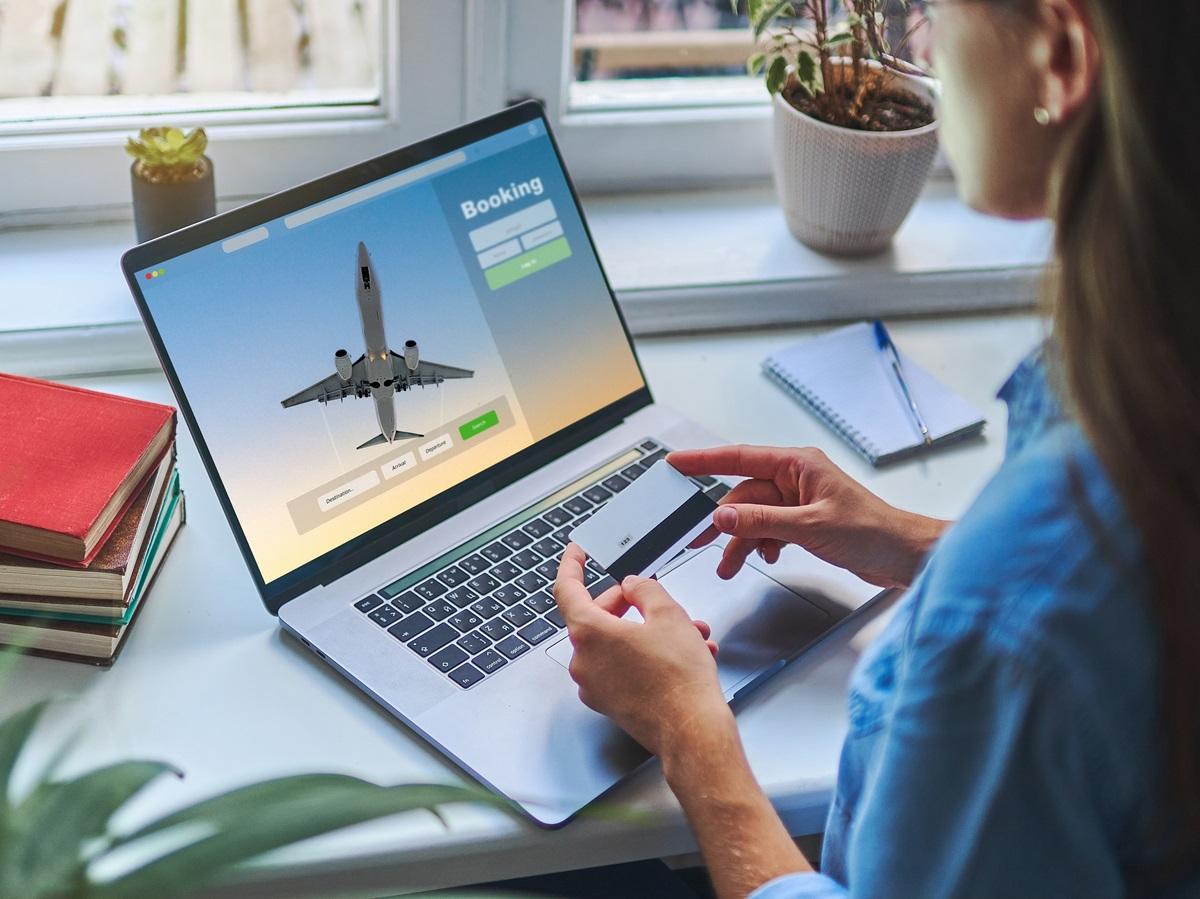
Airfares have been higher than usual so try to get a good deal. Image by goffkein.pro on Shutterstock.
This might sound like common sense.
But with China-US relations at a sobering low, the number of direct flights between the two countries has not rebounded to pre-pandemic levels.
The result? Higher than normal airfares.

This is why it’s even more important to shop around for a good deal. I recommend bundled flight and hotel deals through Trip .
(In case you don’t know, Trip is one of the best travel companies for China because it started there and has a huge offering of hotels, flights, tours, and train tickets.)
3. Plan your flight route

Flights from the US to China vary in terms of the route, flight time and cost. Image by Max Lewandowski on Pexels.
Speaking of flights, will you be flying out of the west coast or east coast?
And which Chinese city will you be flying into?
China is a huge country like the United States, so this will dictate not only how long your flight is , but also the options you have for a possible stopover (which may make the flight cheaper).
If you’re heading to southern China and you’re on a budget, you might find it’s more economical to fly to Bangkok, Thailand and transfer there.
There are lots of options, so it pays to do your research.
4. Consider U.S. government travel advice

Make sure you’re aware of the travel advice. Image by Yamil Najul on Shutterstock.
Before you buy your flights, it’s worth knowing the U.S. government’s official stance on visiting China.
Of the four travel advisory levels, the People’s Republic of China is regarded as Level 3: “reconsider travel”.
The U.S. government says you should “reconsider travel to mainland China due to the arbitrary enforcement of local laws, including in relation to exit bans, and the risk of wrongful detentions.”
I believe the United States is the only country in the world with such advice at the moment (correct me if I’m wrong, in the comments below).
Other countries, such as Canada and Australia, have a lower level of advice, which is to “exercise a high degree of caution”.
It’s such a shame that the USA and China aren’t getting along at the moment.
5. Get a VPN before you leave
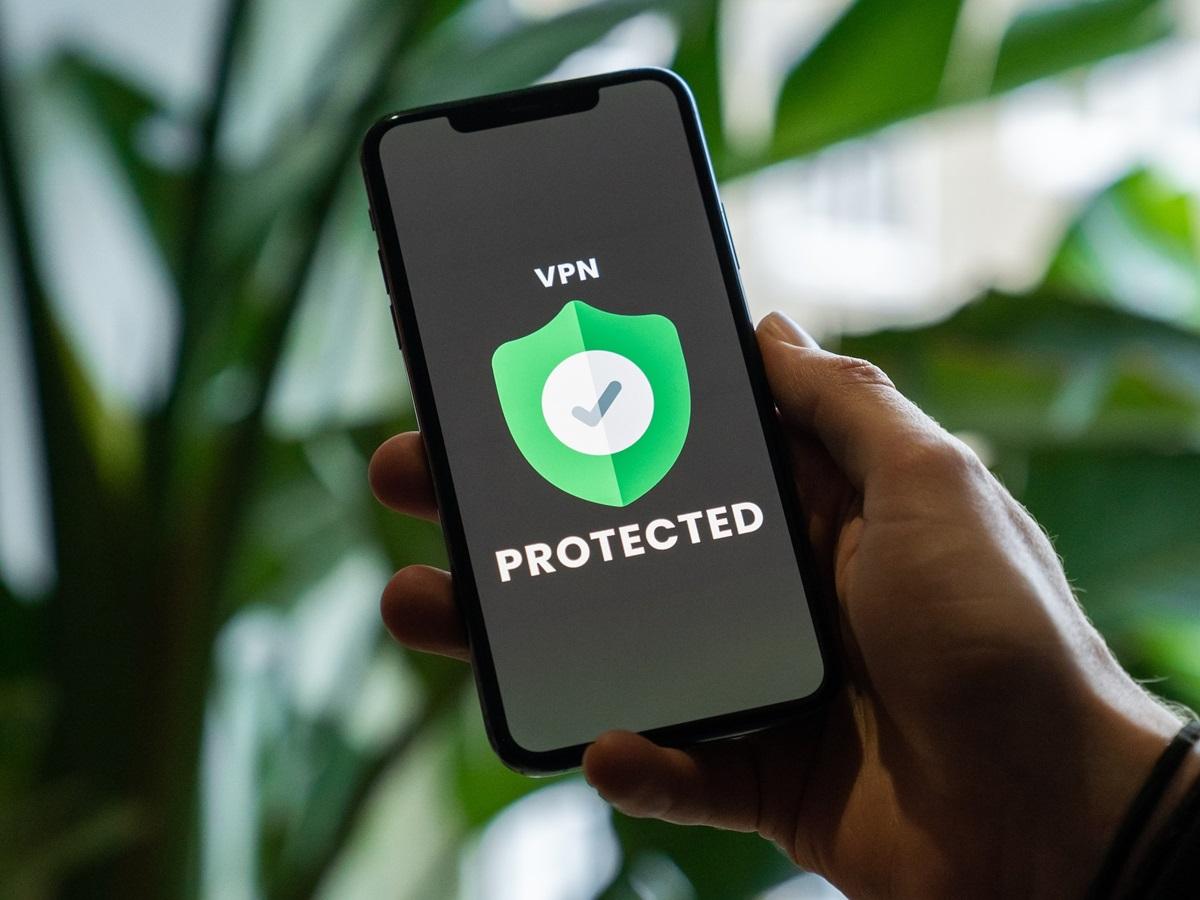
You need a VPN if you want to use hotel Wi-Fi. Image by Privecstasy on Unsplash.
If you want to stay connected with all your loved ones in the United States, and keep using all the sites and apps you’re used to, you’ll need a VPN if you want to use Wi-Fi in China.
Censorship is extensive and the Chinese authorities are making it harder and harder for the VPN companies.
Of course, you can survive in China as an American without a VPN but life is much, much harder. Almost every major American social media and news site is banned, not to mention sites that make our lives easier like Google.
Refer to my page on the best VPN for China which only highlights the ones that work in China.
It’s worth pointing out that the Chinese government isn’t trying to make it hard for foreigners regarding internet access. The restrictions are in place to control what the locals see.
6. Allow enough time for your Chinese visa
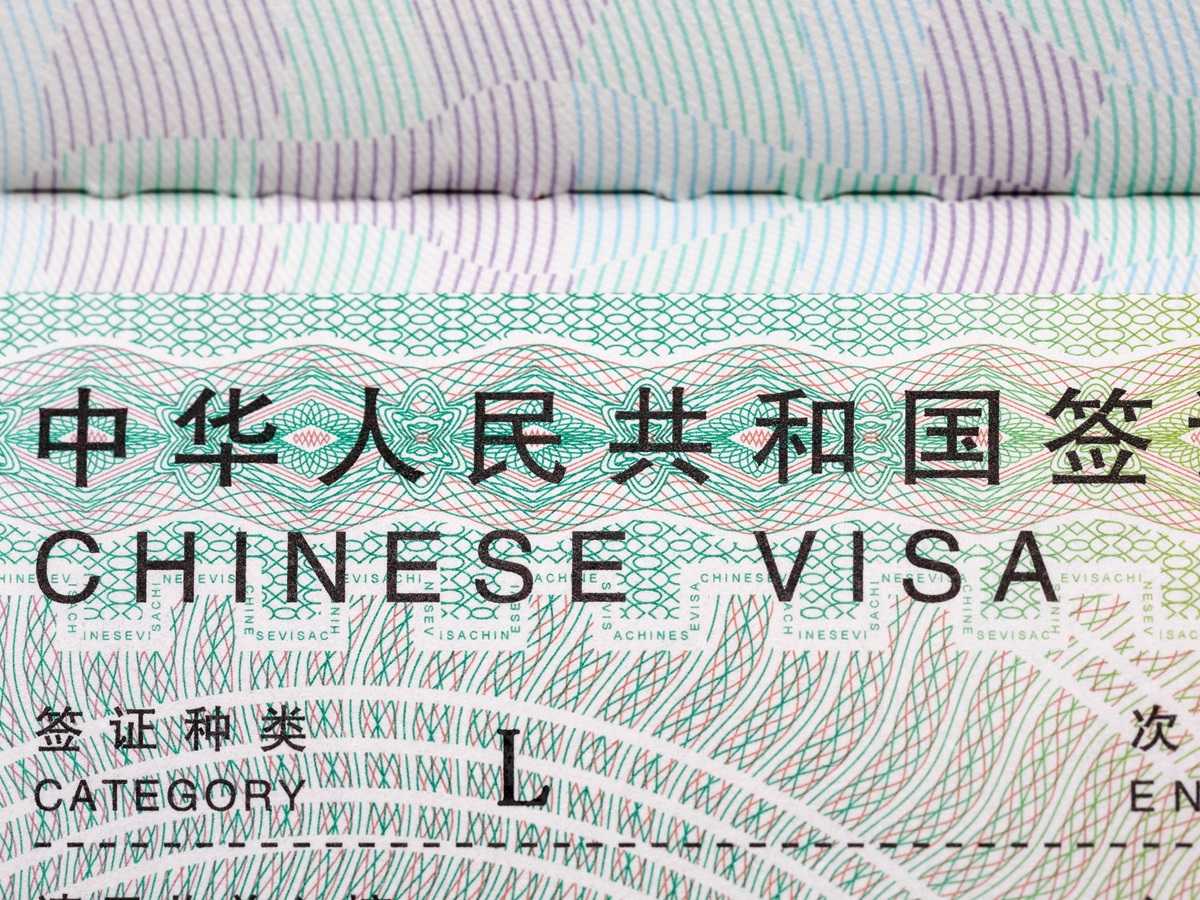
Allow time to get your Chinese visa. Image by Toa55 on Shutterstock.
One of the downsides of being a US citizen traveling to China is the visa process .
Unless you live near one of the Chinese consulates (and you do a walk-in), you’ll need to pay an agent to handle this for you.
You cannot do visa applications by mail. It’s a pain in the butt, and makes your trip a little more complex and costly.
For walk-ins, consulates are located in:
- Washington DC (the embassy)
- Los Angeles
- San Francisco
There used to be one in Texas but it’s closed at the moment.
You can refer to the Chinese embassy’s US page for more info.
When using an agent, allow about a week for visa processing, provided you’ve submitted everything perfectly the first go.
If you need a visa agent, I recommend using a trusted one such as iVisa:
Remember not to buy your airfare until your visa has been issued and you’ve got your travel documents back.
7. Brace yourself for the steps and stairs

One tiny, tiny section of the Great Wall. Image supplied by Mike Cairnduff.
A lot of Chinese tourist attractions have loads of steps and stairs. And I’m talking thousands.
There are no elevators at the natural attractions, either. So, if you’re very unfit and you want to see some of China’s best attractions, you might need to rethink your trip.
From my experience traveling around China the past couple of decades, here are the main culprits with an insane amount of stairs and steps:
- The Great Wall of China (sorry!)
- Longji Rice Terraces near Guilin
- Any mountain (it probably goes without saying) such as Huashan Mountain
- Zhangjiajie, the area that inspired the backdrop in the movie Avatar
- Giant Buddha in Leshan
And there are many more!
Oh, and if you’re in a wheelchair, you’re going to have an extremely hard time in China even in the major cities.
Getting through a temple or the Forbidden City would be impossible (as Chinese traditions involve stepping over the bottom of a doorway), let alone being able to get up and down sidewalks.
8. Ditch the credit cards
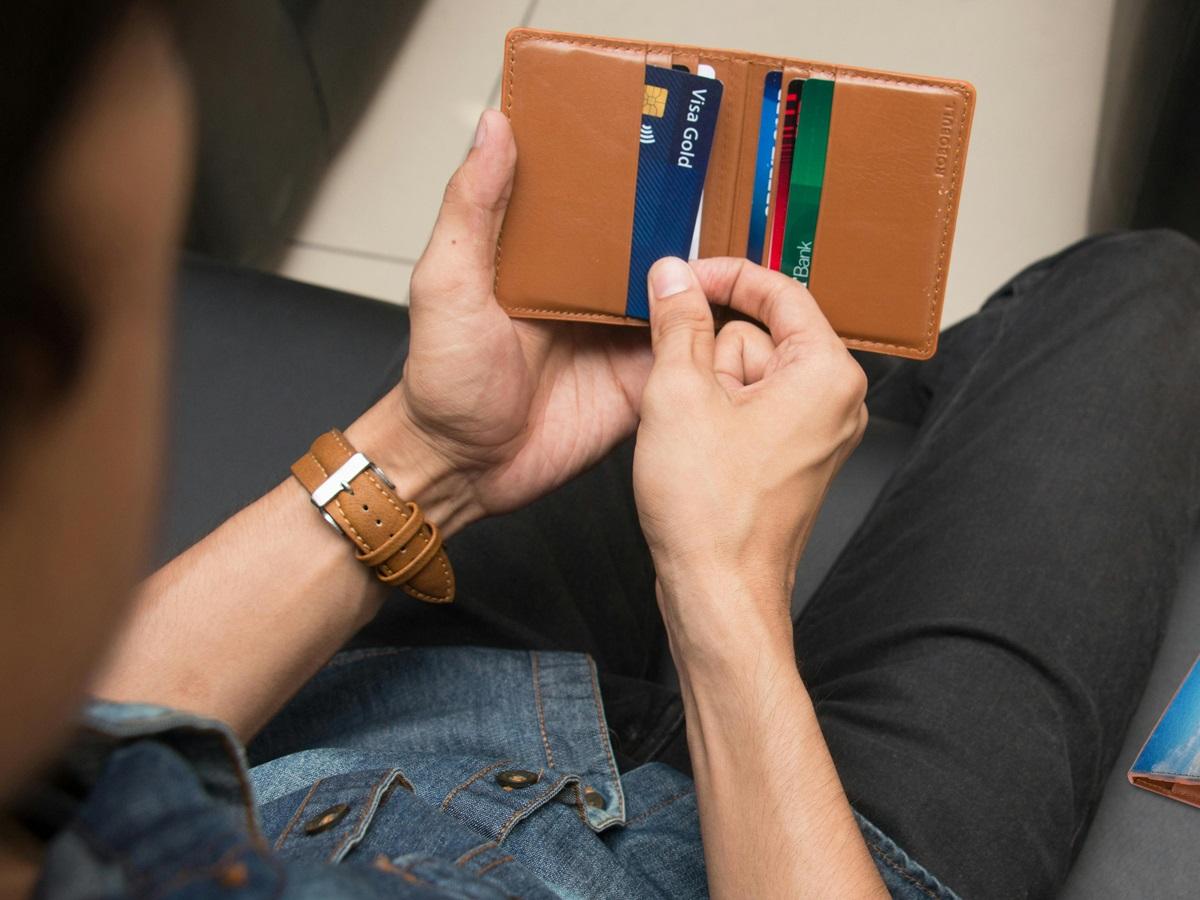
Cash or card? You won’t hear that expression in China. Image by Rann Vijay on Pexels.
In recent years, China has become a lot more advanced than the US when it comes to consumer payments.
You’ll never see a Chinese person pull out a plastic card from their wallet. Everyone pays for stuff using a phone app – either WeChat Pay or Alipay.
The good news? You can too!
If you’re comfortable submitting your personal details (including passport details) to WeChat or Alipay, you’ll be able to pay for everyday stuff in China.
Your only other real option is cash, and that’s a pain because Chinese ATMs only spit out 100 yuan notes.
Small vendors often don’t have change for large denominations. It doesn’t sound like a big deal, but trust me, cash is getting really hard to use in China.
Sign up for Alipay or WeChat Pay, or both, before you head off. If you only sign up for one, my personal preference is Alipay as I find it a lot easier to navigate.
And when you sign up, make sure all your personal details match up, or your application will be rejected.
Customer service for both apps is appalling (it’s practically non-existent), so don’t bother contacting them if you have any issues.
You can check out my China travel apps page for more apps that will make your trip easier.
9. Expect a different hotel experience
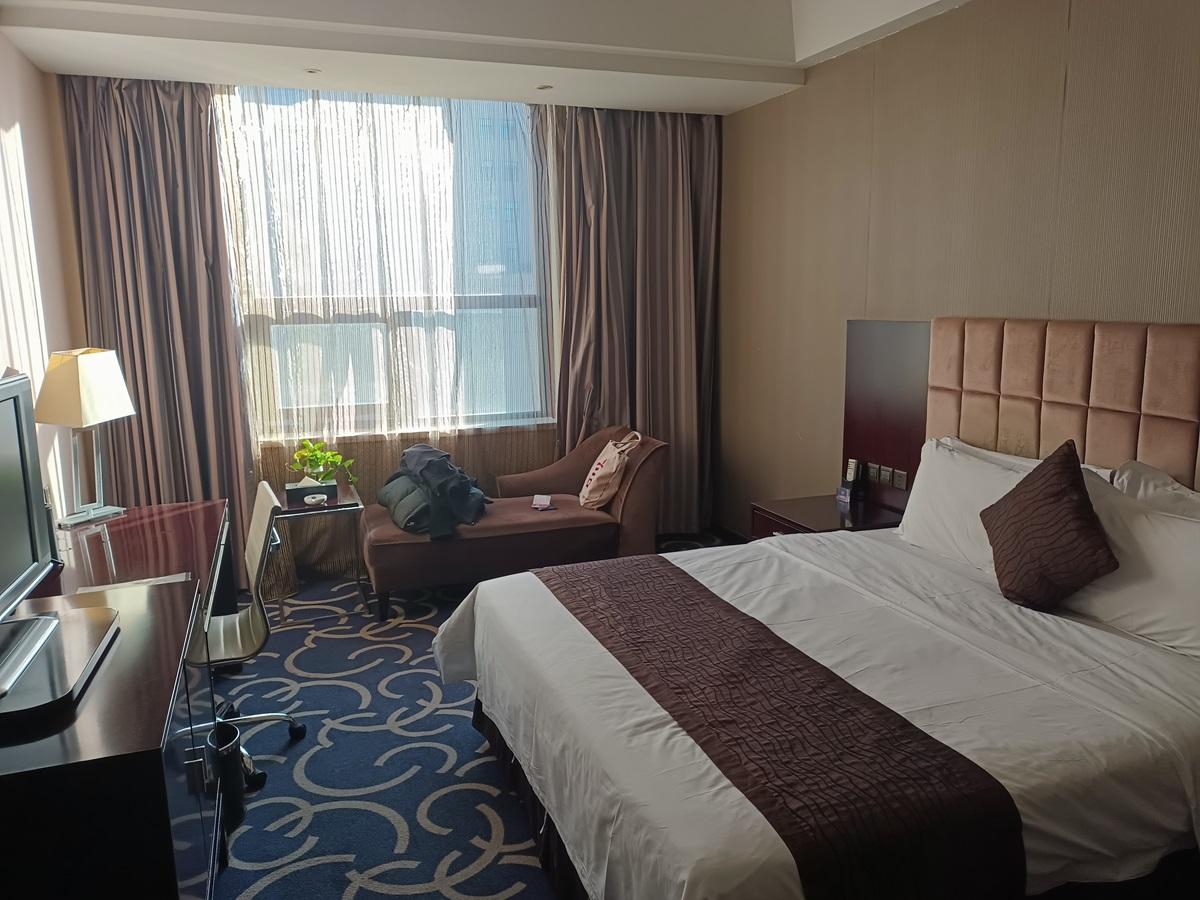
A typical Chinese hotel room in a big city. Image supplied by Mike Cairnduff.
Hotels in China are OK, but they’re certainly not great (unless you’re staying in luxury).
When it comes to dealing with foreigners, Chinese hotel staff are generally helpful but quite shy and reserved. They’re afraid of making mistakes when speaking English.
From my experience staying at countless hotels across China, here are the main things an American traveling to China needs to know:
- Bottled water is provided daily because the tap water is unsafe to drink
- Most hotel rooms don’t have a minibar (but amazing Chinese food won’t be far away)
- Front desk staff can barely crack a smile
- Western breakfast is usually terrible (no fresh dairy, no cereal, bad coffee etc), so choose the buffet option if there is one
- If the Wi-Fi password isn’t printed anywhere, it’s probably 12345678 or 88888888
- Other guests can be noisy so bring earplugs
- Many rooms and hallways smell like cigarette smoke
- Toilet tissue is low quality and they don’t provide enough for two people.
I’ve also found that many Chinese hotels don’t understand what privacy means.
Even if you hang the ‘do not disturb’ sign on your door, you may find that hotel staff have entered the room to clean and so on. This has happened to me countless times.
I hope all of this doesn’t sound too negative. I’m just trying to give an honest appraisal so you know what to expect.
(I’ve written a whole article called What are Chinese people like? if you want to dig deeper into the Chinese psyche.)
10. Good luck with food

The so-called vegetarian dumplings which had prawn in them. Image supplied by Mike Cairnduff.
Chinese food is delicious and so much better than the ‘fake’ Chinese food in the United States.
General Tso’s chicken? Errr, the Chinese have never heard of it!
If you’re part of a tour, then your guide will probably take your group to restaurants to eat. But if you go it alone, here’s my advice:
- Choose a restaurant with photos on the wall or menu, so you can point
- Use a translator on your phone, such as Google Translate (remember to get your VPN )
- Chinese people don’t understand allergies (they don’t exist in China) so if you’re allergic to something know exactly what you’re ordering
- Food will come out at any random order, so don’t expect the rice first
- Locals love spicy food so if you don’t want a scorching mouth, say “Bù yào là” or show them the Chinese characters (不要辣) on your phone.
This list is by no means exhaustive but hopefully it helps you a little!
And remember to get China travel insurance in case you get really sick from food or something else. Medical care isn’t cheap in China.
11. BYO toilet paper
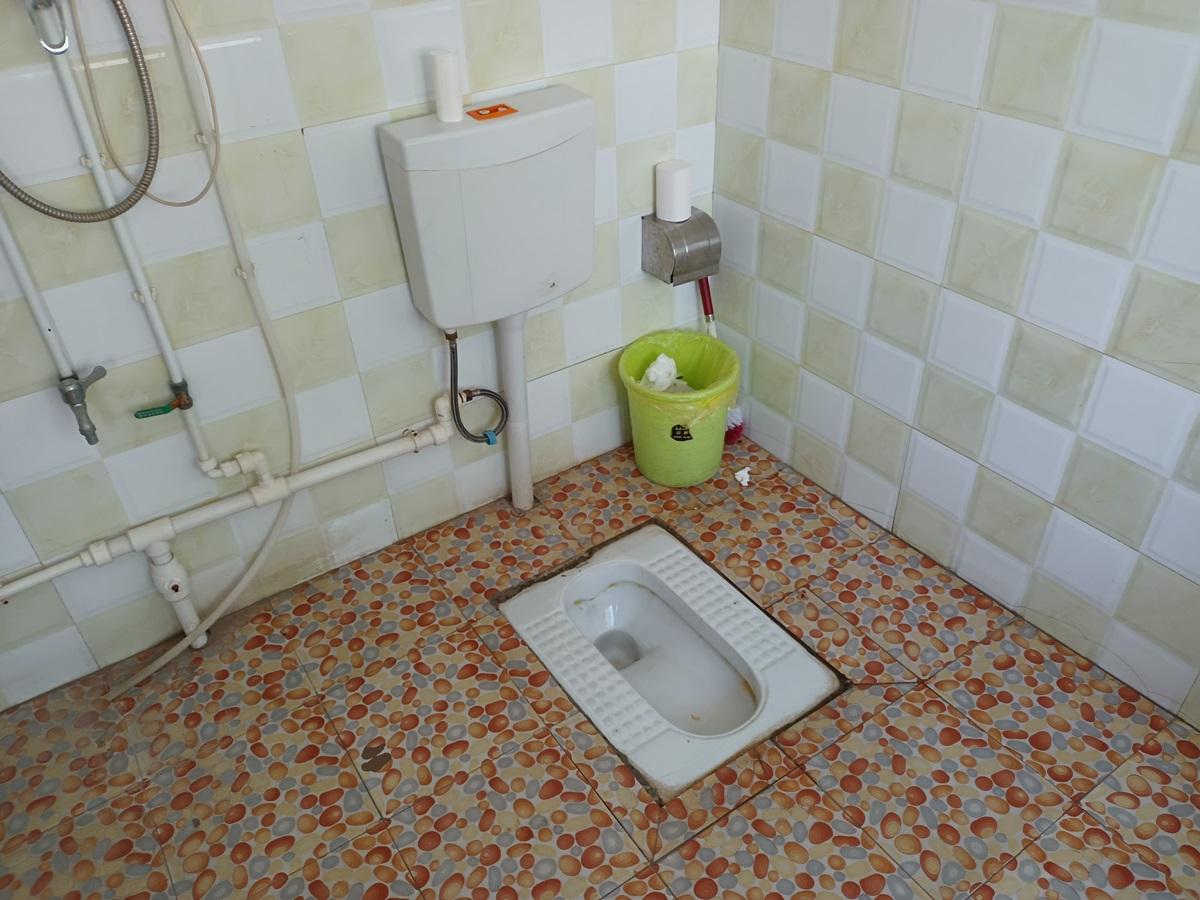
A rare sight – a Chinese toilet with paper provided. Image supplied by Mike Cairnduff.
And finally, the bathroom.
If you’re brave enough to use a Chinese squat toilet , then don’t forget to bring your own toilet paper. It’s not provided, except at hotels.
Similarly, you should BYO hand sanitizer because hand wash or soap isn’t provided in local loos.
It sounds funny to say it, but ‘holding on’ until you get back to your hotel is often your best option.
I hope you liked this special list with US citizens in mind. There’s some more general travel information below, otherwise check out my page on what not to do in China for more helpful advice. Have an amazing time in China!
Main image credit: Krakenimages.com on Shutterstock.
Want more helpful information about China?
Then hop on the monthly newsletter!
One more step: You must click the link in the email we just sent you to confirm your email address.
Helpful resources.
Need help with your trip? Here are some helpful resources:
- See the China travel agency list if you’re looking to join tour groups
- Get a new U.S. passport if yours has less than six months on it
- Familiarize yourself with the food you cannot bring to China
- Don’t forget your China vaccinations especially if you’re going to rural areas or you’ll be around animals.
Assistance for U.S. citizens in China
Hopefully you won’t require consular services, but if you do then here are the contact details for the U.S. embassy in Beijing:
- Address: No. 55 An Jia Lou Road, Chaoyang, Beijing
- Phone: (+86) 10 8531 4000
- Email: [email protected]
- Website: https://china.usembassy-china.org.cn
There are also consulates in Shanghai, Guangzhou, Wuhan and Shenyang.
FAQ for Americans traveling to China
Are americans allowed to go to china right now.
They sure are. China is open and warmly welcomes American tourists.
Is China good for Americans?
Yes, China is good for Americans because it’s safe, there are lots of attractions, and things are cheap.
What should I know before traveling to China?
The main things are to get a VPN if you want to connect with the outside world via Wi-Fi, don’t tip anyone, download Alipay or WeChat for easy payments, and bring toilet tissue everywhere you go.
Is it safe to travel to China as an American?
Yes, China is safe for American citizens. Just remember to follow all local laws and you should be fine.
Is it safe to bring my phone to China?
Of course. In fact, you’ll need your phone to make payments in China, unless you only want to use cash which can be troublesome at small businesses.
Commercial relationship disclosure: The Helpful Panda has commercial arrangements with organizations that may appear on this page, such as affiliate links. See our terms for more info.

Mike Cairnduff
Mike has lived and worked in China, and has traveled extensively across the country. He loves Chinese food and has a keen interest in Chinese culture. You can follow him on X and LinkedIn .
Got a question or comment?
We welcome relevant and respectful dialogue. See our terms for our comment policy.
More Great Content
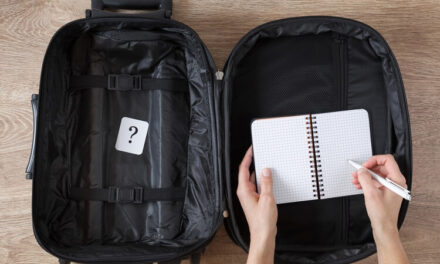
What not to bring to China (11 things)
Updated March 26, 2023

Is Instagram banned in China in 2024? (Spoiler: yes)
Updated October 31, 2023

A 5-day itinerary for Fuzhou (from someone who lived there)
Updated April 28, 2023


12 tips for solo travel in China (from a self-proclaimed expert)
Updated August 15, 2022
Recent Posts

Recent Comments
- Mike Cairnduff June 6, 2024 on Keats Chinese School Review (I went undercover!)
- An June 6, 2024 on Keats Chinese School Review (I went undercover!)
- Mike Cairnduff June 5, 2024 on What every American traveling to China in 2024 needs to know
Ads space (New)

Explore China
Do you want to build your career in China?
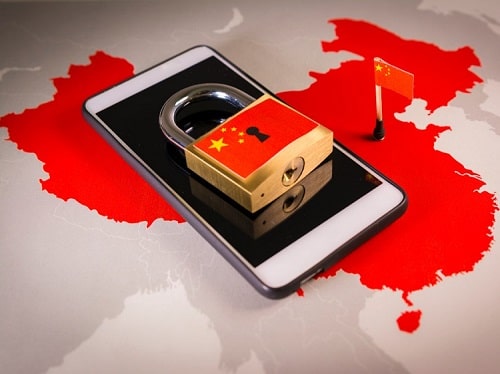
Our writers have all experienced China in person. Support them by subscribing to the free monthly newsletter about visiting China.
Is it safe to travel to China?

China is generally a safe country to travel to, as long as you know where you’re going and stay alert. China is visited by travelers from all around the world, and is of no danger to any person who understands local cultures and obeys local laws.
In saying this, China’s government does keep quite a tight lid on foreign influences, such as websites and news coverage, with internet censorship and public surveillance a common occurrence all over the country. Demonstrations and protests are prohibited in public places in China, and if you find yourself in one, or you take a photo or video of the event, this could land you in trouble.
Here are few other things to take note of when visiting China.
For the most part, China is a safe place to visit, and crowds in public places should not cause any worry. Of course, small risks are still present, including petty theft and pickpocketing in tourist areas, as well as at train stations and on sleeper buses and trains. As you have to carry your passport to purchase many things in China (SIM cards, train tickets, etc), be super vigilant, and always have photocopies and/or digital copies.
If you do find yourself haggling and bargaining in markets, be sure you have correct change and keep confident when negotiating with the stall holder. Paying for unmarked or unpriced goods may get you caught paying a whole load more, and if you’re not equipped with any Chinese phrases to use in the transaction, the language barrier will work against you.
Other scams you might encounter include being invited into a local’s home for a tea ceremony, and at the end, presenting you with an inflated bill of around RMB 1000 (USD 156). Always go with a reputable provider, or agree on a price beforehand.
As with many Asian countries, crossing the road safely does pose a higher risk than usual due to lax road rules, especially in smaller cities with less traffic lights. Even if you are crossing on a green pedestrian light, ensure you look both ways and cross safely, as there have been instances of tourists being seriously injured by late-coming vehicles.
Taxis are something to be wary of, too. When arriving in a city, always hail a taxi from the marked taxi rank and ensure the meter is on. Some taxis do not have seatbelts and are notoriously manic drivers, so if you do feel uncomfortable, request one with belts.
China has had widespread problems with environmental deterioration for years with the rise of industry. Air pollution is a problem in major cities around the country, so keep an eye out for air quality indexes each day, especially in hotter seasons, and if air quality is poor, limit your outdoor sightseeing.
Typhoons and monsoons are quite common around China, particularly in the south and southeast coastal areas between April and October. Low-lying areas around the Yangzi and Li rivers are also prone to flooding during this time. If you are travelling around then, keep constantly updated with weather forecasts.
Exercise normal safety precautions if you are visiting as a solo or female traveler. Stay to well-lit areas at night, keep your valuables (especially your passport) safe and travel in groups if you can.
- Keep your valuables safe in crowded places and on public transport
- Be extra careful when crossing the road, even on a green light
- Have your accommodation address written down in Chinese, and carry it with you at all times
- Do not get involved or go near protests or demonstrations of any kind
Is water safe to drink in China?
Find out more about current travel alerts
Let's create an exclusive trip for your group.
Is It Safe in China?
:max_bytes(150000):strip_icc():format(webp)/EBC_pose-591232dc5f9b586470fb3268.jpg)
d3sign / Getty Images
It's extremely rare for travelers to come into any problems with physical safety in China. Safety issues while traveling in China usually end up being petty thievery, like pick-pocketing, and maybe some issues with travel sickness.
Regardless of China's safe reputation, travelers should still be appropriately careful, especially female travelers. If you can learn a bit of Chinese before you go or while you travel, it will probably be useful if you get into a pinch. But otherwise, as long as you keep your personal belongings safe and you use general good sense, including being careful about water and food safety , you will have a successful and safe trip to China.
Travel Advisories
- As of November 24, 2020, the U.S. State Department warns travelers to "Reconsider Travel" to mainland China and Hong Kong due to COVID restrictions and the arbitrary enforcement of local laws.
- The U.S. State Department warns visitors that the Chinese government arbitrarily uses detentions and exit bans to detain both Chinese nationals and international visitors, with limited legal recourse if you are caught up.
Is China Dangerous?
If you're wondering if China is dangerous in terms of robberies or violent crime, then the answer is no, not really. The crime rates in China are some of the lowest in the world, even lower than countries like Spain, Germany, and New Zealand (and much lower than the U.S.). Crime still exists, of course, and you should always take the basic precautions. But, in general, you can explore freely in China without having to worry about being robbed or assaulted.
That's not to say there aren't other safety concerns, with one of the main ones being the Chinese government itself. The national government does not take well to criticism, and even a private text message disparaging the leading Communist Party could be considered too offensive. Foreign visitors have been detained without a clear reason or access to a lawyer, so it's best to refrain from sharing your opinions until after you've left the country.
Is China Safe for Solo Travelers?
Whether you're sticking to big cities like Shanghai and Beijing or exploring the rich countryside, traveling solo around China is perfectly safe. If you don't speak the language, it isn't always easy to communicate and there may be difficulties trying to navigate, but that's all part of the adventure. Consider buying a SIM card to use with your phone when you arrive so you have access to the internet wherever you are and can easily pull up a map or an online translator.
One area that solo travelers especially need to be wary of is protests. Any type of manifestation against the government is not taken lightly, and police officers or even soldiers are likely to show up and respond with violence. As a lone foreigner, you're even more likely to stand out. It's best to avoid protests completely if you don't want to run the risk of being detained.
Is China Safe for Female Travelers?
Local Chinese people you meet might think it's odd that you would elect to travel by yourself as a woman, but this perception will be more in terms of their questions about where your friends are and why you don’t have a boyfriend or husband along with you. If you are younger, other questions might arise about why your parents would allow you to travel on your own if you don't have to.
Keep in mind that these questions arise because people are curious about you and why you're in China. It is safe to say that most of the time, these questions are meant with no ill will so try not to take offense, even if you find the questions slightly intrusive.
Generally, you do not have to fear for your physical safety when traveling alone in China. It would even be pretty unusual for you to experience catcalling.
Safety Tips for LGBTQ+ Travelers
LGBTQ+ rights in China are complicated. While same-sex activity and choosing your gender identity are both permitted under the law and tacitly accepted, LGBTQ+ rights are by no means "celebrated" in the country. Events such as Pride are routinely canceled, and a law passed in 2015 prohibits the depiction of "abnormal sexual behaviors" in all visual and audio content, which includes gay relationships.
Despite the repression, China is still a relatively safe place to visit for LGBTQ+ travelers. Locals may ask single travelers if they have a boyfriend or girlfriend, and it's up to you to feel the situation out and decide whether or not to respond truthfully. Public displays of affection are looked down upon for all couples, straight or gay, and not recommended.
Safety Tips for BIPOC Travelers
China's general safety applies to BIPOC travelers as well, although foreigners are still a novelty to many local residents and non-Chinese visitors are likely to attract attention, even in cosmopolitan cities like Shanghai. Travelers of color, and Black travelers, in particular, are likely to receive stares and even have their picture taken by strangers. It's not uncommon for parents to hand you their babies to get a photo together. The attention may seem quirky at first, but it can also grow tiresome. If you don't feel like being approached, just remember that it's a cultural difference and comes from a place of sincerity. The best response is to smile and say, " bu yao, xiexie, " or "no, thank you."
Safety Tips
- Pedestrians in China do not have the right of way. Always look both ways before crossing a street, even if there's a crosswalk or a stoplight giving you permission.
- Taxis are generally safe to use in China, but make sure you flag an officially designated cab and that the driver turns the meter on once they start driving.
- Keep your valuables secure in your front pocket or a closed-bag to deter pickpockets, especially when visiting touristy areas.
- Air quality can reach noxious levels around big cities or industrial areas, so keep an eye on daily pollution levels through newspapers or online. Use a face mask and, on particularly smoggy days, consider staying inside, especially if you're asthmatic.
U.S. State Department. "China Travel Advisory." September 14, 2020.
Numbeo. " Crime Index by Country. " 2020.
Is It Safe in Egypt?
Is It Safe in Guatemala?
Is It Safe in Iceland?
Is It Safe in Rio de Janeiro?
Is It Safe in Sweden?
Is It Safe in Barbados?
Is It Safe in Germany?
Is It Safe in Colombia?
Is It Safe in Mexico?
Is It Safe in Thailand?
Is It Safe in Peru?
Is It Safe in Russia?
Is It Safe in Jamaica?
Is It Safe in Europe?
Is It Safe in Puerto Rico?
Is It Safe in Trinidad and Tobago?
10 Safest Cities in China
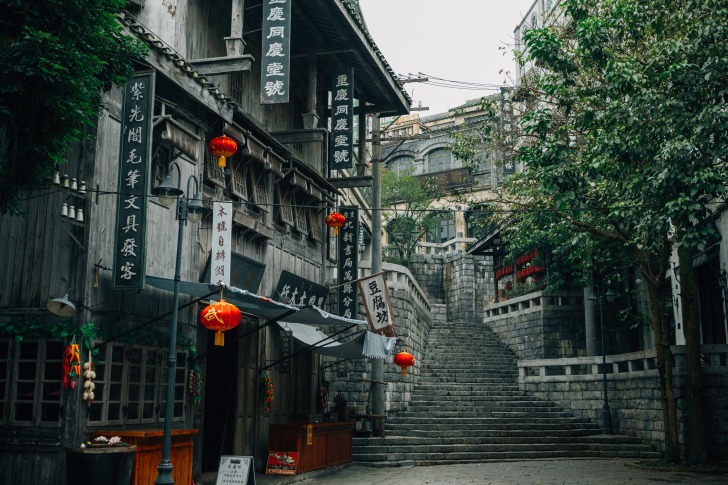
China is considered a very safe place for tourists to visit and explore.
In fact, the biggest reported crimes in most areas are corruption and bribery – and even those are ranked as moderate in comparison to other countries.
Still, every country has areas that are less safe than others, as well as those that are safer overall.
And before you start planning your trip, you should know which areas are considered the safest.
2. Shanghai
3. hong kong, 6. shenzhen, 8. changsha, 5 safety tips for traveling to china, china safety overview, are there any cities to avoid in china, how much do i have to worry about being scammed in china, how do i know which restaurants are safe to eat at.
The following are ten of the safest places to go in China, according to their crime and safety indices.

There are really too many things to do and see in Beijing, including The Great Wall, The Summer Palace, The Ming Tombs, museums, zoos, parks, canyons, and more.
And you can experience Chinese culture through a mix of history and modern beauty.
It’s such things that lead millions of people to visit every single year.
If you want to be among them, there’s good news.
It’s a pretty safe place to visit, boasting a crime index of only 28.43 and a safety index of 71.57.

What’s on your itinerary for visiting China?
Regardless of whether you’re hoping to enjoy some great shopping, eat delicious food, explore an incredible mix of Eastern and Western cultures, check out some impressive nightlife, take in beautiful architecture, or something else, Shanghai is the place for you.
You can also find some familiar things in this area, like KFC and McDonald’s, as well as Disneyland.
And it’s a very safe place to visit, with a crime index of just 30.55 and a safety index of 69.45.
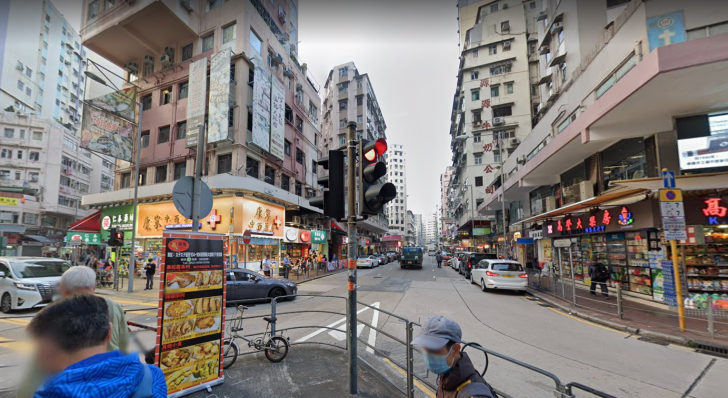
Though there was a time safety was an issue in Hong Kong, it’s gotten much better.
In fact, the most current reports show a crime index of 21.47 and a safety index of 78.53 – putting it on par with the other cities on this list.
And that’s a great thing since it’s one of the most diverse areas in China.
You can enjoy cuisines that come from multiple cultures, including Japanese, Thai, Indian, African, and more.
And don’t forget the incredible shops and markets where you can discover just about anything.
And as it’s so diverse, you’ll find that many residents speak English and most signs are easy to read.
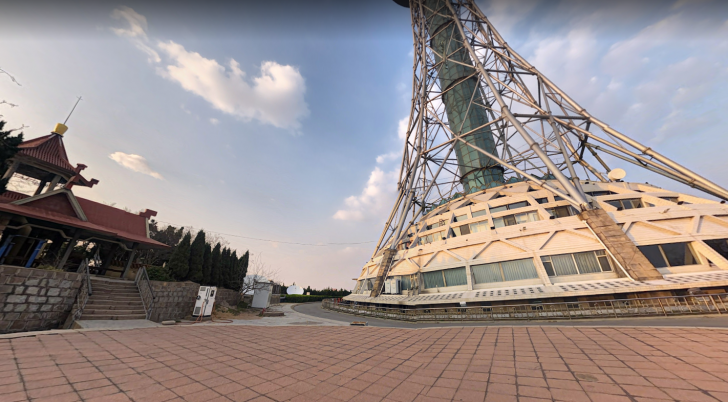
If you’re looking to enjoy China at a bit of a slower pace, Qingdao is a good place to visit.
There are still plenty of great restaurants, beautiful architecture, museums, and city life to take advantage of.
However, there are also several peaceful parks, piers, and beaches to enjoy.
And this low-key atmosphere helps give Qingdao a very low crime index of 9.33 and high safety index of 90.67.
If you’re planning to travel through China, you might want to let Qingdao be your last stop, as it is a great place to wind down and wrap up a vacation.

Tianjin is not exactly a small place – it’s actually a big city.
However, people love it thanks to the small-town feel.
Yes, there may be business, beautiful architecture, and marvelous art surrounding you, but so are some of the friendliest people.
Don’t be surprised to be invited to stay for a drink or even play a game with some of the local shopkeepers.
These awesome characteristics are part of the reason that Tianjin has a low crime index of 34.45 and a good safety index of 65.55.
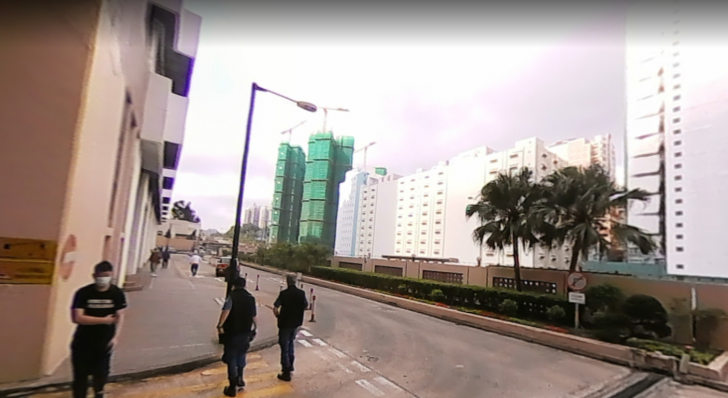
Shenzhen is an amalgamation of styles and features.
It is, indeed, a booming manufacturing seaside town, but don’t let that fool you into thinking it’s not a good place to visit.
It’s covered with plenty of activities, including theme parks, beautiful parks and gardens, folk villages, and zoos.
And, of course, you’ll find plenty of food and will likely get treated to some great street music or various forms of art.
If you love to read, you have to visit Book City, which is full of bookstores and book bars that never close.
And with a crime index of 28.90 and a safety index of 71.10, you should feel pretty safe in the area.
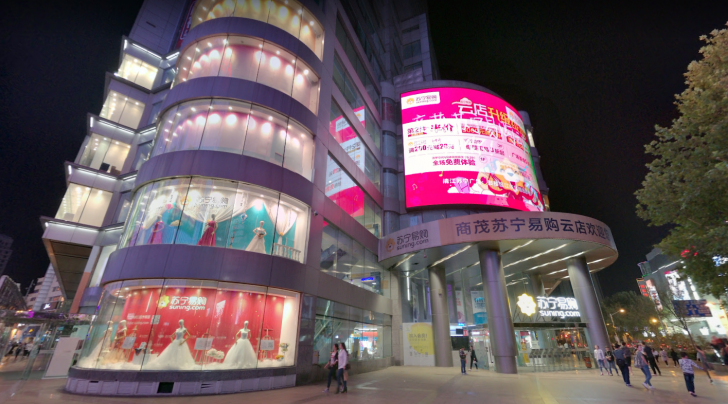
Nanjing was once the capital of China and is now known as one of the Four Great Ancient Capitals of China.
The great thing is that you get an incredible ancient feel there, thanks to the historical sites.
You can visit the Confucius Temple and even the Nanjing Massacre Memorial for a real step back in history.
Worry not, though, as there are plenty of modern activities as well, including great brand-name stores, delicious food, fun nightlife, and more.
And with a crime index of 13.52 and a safety index of 86.48, both tourists and residents feel safe enjoying all that Nanjing has to offer.
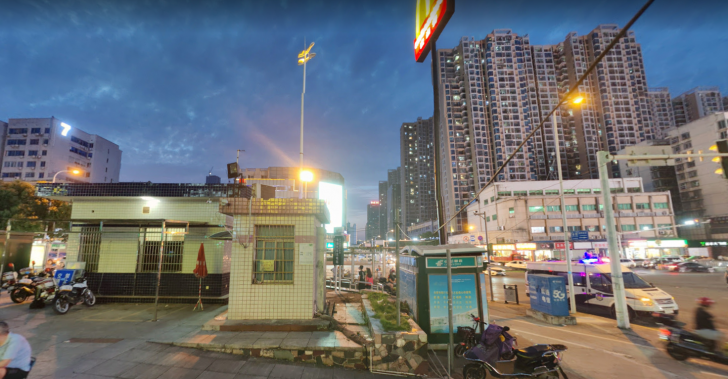
Though China is full of cultural significance, Changsha tends to exude it.
There are plenty of modern things to do, including enjoying the beautiful lights along the riverfront, but the ancient Hunan presence is still very much upon it.
Take some time for contemplation on Yuelu Mountain, marvel at the ancient city walls, or explore the Hunan Provincial Museum.
You might also enjoy a Hunan Discovery Tour.
The crime index is really low at just 19.47 and the safety index is 80.53 – making it one of the safest cities to visit in China.

If spring is your favorite season, consider visiting Kunming at any time of the year.
It’s known as “Spring City” and “the City of Eternal Spring” thanks to its mild, beautiful climate year-round.
Aside from that characteristic, a trip to Kunming also provides you with amazing landscapes to view or photograph.
And while you’re there, you can visit various beautiful temples, botanical gardens, parks, and villages.
This city is typically used more as a stop-through than a full-time vacation destination.
However, between all it offers and a low crime index of 24.57 and a safety index of 75.43, there’s no reason not to hang around for a while.
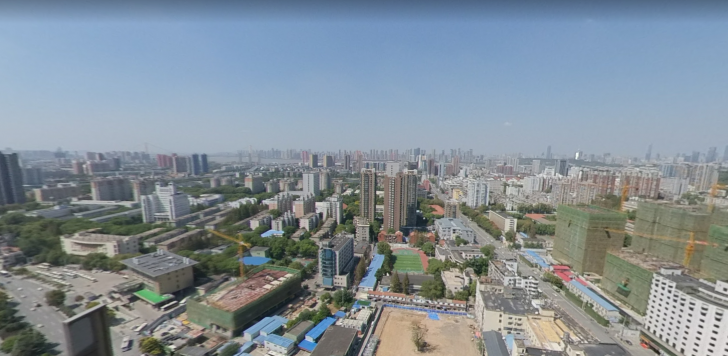
Wuhan might just be one of the most fascinating places to take kids in China.
What child wouldn’t want to visit the Wuhan Haichang Polar Ocean World filled with polar bears, beluga whales, penguins, dolphins, walruses, and more?
You can also enjoy a view of the Yellow Crane Tower, visit some really fun theme parks, watch the Dragon Boat Festival, and – of course – enjoy some very delicious food.
With a crime index of 25.00 and a safety index of 75.00, you can feel safe about traveling with your family to Wuhan.
Generally speaking, China is a safe place to travel, so you shouldn’t fret too much when planning your trip.
However, no place on earth is 100% safe, as there will always be nefarious beings, weather, and other issues you can’t control.
The following tips can help reduce your risk of being affected by such things.
- Leave the backpacks behind . Backpacks tend to attract thieves wherever you travel, so leave them back in your hotel.
- Don’t dress to impress . You don’t have to look like you just rolled out of bed or anything – just don’t be too flashy. And this doesn’t just apply to clothes. Don’t flash a nice phone, either, as tech is the main target for thieves.
- Don’t look like a tourist . Like every other tourist area, there are both thieves and scam artists in China – and they target tourists. Don’t draw more attention to yourself by wearing a camera around your neck and things like that.
- Don’t carry much cash . It’s best to keep the amount of cash you have on you limited and leave the rest back in your hotel safe. This will limit the amount a thief or pickpocket could potentially get.
- Keep your purse or wallet in front of you . If you’re taking a wallet, slide it into your front pocket. If you’re carrying a purse, try to take a cross-body one that you can keep in front and keep it zipped up tightly.
READ THE FULL REPORT: China Safety Review

- OVERALL RISK: MEDIUM
- TRANSPORT & TAXIS RISK: MEDIUM
- PICKPOCKETS RISK: HIGH
- NATURAL DISASTERS RISK: MEDIUM
- MUGGING RISK: LOW
- TERRORISM RISK: MEDIUM
- SCAMS RISK: HIGH
- WOMEN TRAVELERS RISK: LOW
Frequently Asked Questions
Overall, you should be safe traveling throughout China, but some people recommend avoiding areas along the border.
This is not due to China itself but more that there could be criminal activity in these remote areas.
Like any tourist area, you can expect people to attempt to scam you.
A common one is what’s known as the Tea Scam, which is when someone invites you to tea and leaves you to pay – and it’s usually a pretty expensive bill.
According to many residents and travelers, if you meet a local who is extremely friendly and simply won’t take “No” for an answer, it’s a good indication that it’s a scam attempt.
It’s not that there aren’t friendly people in China – there are many.
However, the scammers are those that are simply too pushy – even to the point that they’ll follow you around or grab your clothes.
It’s no secret that not every restaurant and food vendor has the same level of hygiene and food safety – that includes in China.
One of the best tips provided by both residents and travelers is to watch the locals.
If you see many locals visiting a restaurant or vendor, it’s probably one you can safely eat from.
Additional Resources

2 Comments on 10 Safest Cities in China
With its rich history and modern amenities, Nanjing is one of the safest cities in China. The city has an effective police force and low rates of crime, particularly violent crime. If you haven’t been to this place, now is the best time to visit!
These cities have well-trained and well-equipped police forces that maintain public safety and order. The community and the visitors feel more secured knowing that the place has good governance.
Leave a Comment Cancel reply
Popular destinations.

Safety Index
Recent reviews & comments.
- Joseph MANIRAGUHA on Rwanda
- Anonymous on Norway
- Triangle Man on Ulaanbaatar
- Mike on Cambodia
- Someone on China
Popular US States
- Pennsylvania
- Find a Tour
- China Tours
- Student Tours
- MICE Travel
- Destinations
- Virtual Tours
- Safety Tips for Travelers to China

Overall, China is very safe for travelers. People are friendly and more than willing to help foreign travelers, even if they speak little to no English. Violent crimes are rare, and it is safe to walk alone on the streets any time of the day or night. Female travelers can also rest assured that they can walk the streets safely, use public transportation without any concern, and take cabs without incident. Even so, it’s important to take some safety precautions whenever you are traveling in a foreign country. Below are some tips to help you stay safe while traveling in China.
1. Avoid confrontations
Chinese people generally avoid confrontation, but fights can happen and it is important to avoid getting involved in any sort of physical confrontation with locals. This is a rule that applies to pretty much any country, including China. If you happen to see two locals ensnared in a fight, do not get involved.
It’s also worth noting that some Chinese people talk loudly in what can sound like harsh tones to foreign ears. This does not mean they are having a verbal confrontation, however; it’s just the way they speak.
2. Obey local laws
China may have different laws than your home country. It’s important to know that China has harsh penalties for people who possess or sell illegal drugs, and these rules and punishments apply to foreign citizens too. China may refuse entry to a foreigner caught trying to smuggle drugs into the country. Depending on the amount and the type of drug, violators can expect to receive sentences that range from a few years in prison to the death penalty, as well as a financial penalty.
3. Keep valuable possessions in a safe place
Pickpockets are uncommon but not unheard of in China, so keep your wallet or purse where only you can reach them. Do not leave your belongings unattended, and do not keep your phone in a place where someone can easily grab it. Be sure to write down your hotel’s phone number and keep it with you in case you leave something valuable in your room and need to contact the hotel.
4. Avoid illegal taxis
There are usually fixed places to hire taxis at large airports or train stations in big cities, and you can ask the staff where to get a taxi if you cannot find it. There may be people who approach you at the exit of the airport or train station and offer you a taxi ride. We suggest you ignore these people, however, because they may not be licensed taxi drivers, and their cars may not be in good condition. They may also try to overcharge you or give you false banknotes.
5. Road safety
In China, when crossing roads or bicycling, even if you are on a crosswalk, be careful of vehicles. Some Chinese drivers are reckless and do not give pedestrians the right of way.
6. Watch out for scams and tourist traps
One of the most common scams you’ll see as a tourist in China consists of people approaching you and offering you something politely, especially souvenir-type items at tourist sights. After you accept their offering, they may ask you to pay or donate some money. We suggest refusing any items that strangers offer you for no reason.
Another kind of scam involves young people pretending to befriend you to bring you to a nice bar or nightclub. The end result is an excessively priced cup of tea or drinks. Do not accept strangers' invitations no matter how friendly or insistent they are. If you refuse them, they will quickly move on to try to find another unsuspecting visitor.
Another common scam is people who will replace your genuine banknote with a fake one and then return the fake banknote to you claiming that the money you gave them is fake. This normally happens when paying cab drivers or street vendors. They usually do this with 100 yuan notes, since they are most valuable, although it may happen with 50 yuan notes too. Our suggestion is to keep some 10 or 50 yuan banknotes for small payments and avoid using 100 yuan notes when taking taxis or making small transactions.
At some tourist sights, you may see local people dressed in traditional clothes. Be sure to ask before taking a picture of or with them, because they may charge you for the photograph afterwards.
7. Ask for help from locals
If you are traveling on one of our tours, your guide and driver will accompany you and help you handle any hassles or difficult situations during the day. During your free time, your guide and travel specialist will be available 24/7 by phone or text and will be ready to help whenever you may need.
If you are traveling on your own and encounter an unsafe or urgent situation, you may ask for help from the local people around, especially those in uniforms. Before your trip, be sure to let your loved ones back home know where you will be and pass on your flight and hotel information.
The China Guide is a Beijing-based travel agency that customizes private tours, educational student tours, and incentive trips across China. We have more than ten years of experience crafting tours for tens of thousands of travelers from the United States, Canada, Australia, the United Kingdom, Germany, France, Spain, and beyond. We promise all our tours have no hidden fees, no shopping stops, no touristy restaurants, just memorable experiences! Learn more about us or contact us to start planning your perfect China trip .
- A Quick Guide to Chinese Tourist Visas
- Eating and Drinking in China
- Best and Worst Time to Travel to China
- Traveling in China as a Wheelchair User
- Cash or Credit Card? How to Pay for Things in China
- Healthcare in China and Travel Insurance
- Everything You Need to Know about Chinese Toilet
- The Best Souvenirs to Bring Back from China
- How to Book Forbidden City Tickets Online
- How to Avoid the Crowds When Traveling in China
- The 10 Breakfast Foods You Should Try in China
- 10 Movies to Watch Before Your First Trip to China
- Five of the Best Documentaries about China
- Using Your Cell Phone and the Internet While Traveling in China
- The China Guide Rated "Excellent" Since 2012 on Tripadvisor
- 10 Best Tours for First-Time Travelers to China
- Report: Choices of Travelers to China

US issues level 3 travel advisory to China amid safety concerns. Here's what to know

Are you thinking about traveling to China to visit or study abroad? The U.S. government suggests reconsidering your trip for now.
According to the U.S. Department of State , traveling to China is under a level 3 travel advisory , warning Americans to reconsider. The State Department has four warning levels. The fourth is “Do not travel.”
Is it safe to travel to China right now?
The U.S. is asking Americans to reconsider traveling to China due to various reasons, including concerns about health and safety, such as the prevalence of contagious diseases like COVID-19, as well as political tensions or security risks in certain regions.
As of April 12, there are some specific areas that the U.S. is asking people to reconsider travel to. Those areas include:
- Mainland China due to the arbitrary enforcement of local laws, including exit bans and the risk of wrongful detentions.
- Exercise increased caution when traveling to the Hong Kong SAR due to the arbitrary enforcement of local laws.
- Reconsider travel to the Macau SAR due to a limited ability to provide emergency consular services.
Additionally, the U.S. government may issue travel advisories based on factors like civil unrest, natural disasters, or other hazards that could affect travelers' well-being.
Americans detained in China
Mark Swidan — a man from Houston, Texas — has been detained in China for over 10 years on drug charges. According to The Texas Tribune , Swidan was detained in China in 2012 while on a trip looking for materials for his home and business in Houston. Chinese authorities arrested him after his driver and translator were found in possession of drugs. The driver blamed Swidan, who is accused of trafficking and manufacturing methamphetamine.
A review of Swidan’s case said there were no drugs on him or in his hotel. Last year, the Republic of China’s Jiangmen Intermediate Court denied Swidan’s appeal and upheld his death penalty with a two-year suspended death sentence.
Other Americans considered wrongfully detained include Chinese American businessman Kai Li from Long Island, N.Y., and California pastor David Lin.
What countries have a Level 3 travel warning?
- Trinidad & Tobago
- El Salvador
- South Sudan
- Democratic Republic of the Congo
- Papua New Guinea
- Saudi Arabia
What countries have a Level 4 travel warning?
- Afghanistan
- Central African Republic
- North Korea (Democratic People's Republic of Korea)
- Burkina Faso
Traveling abroad? Here are some safety tips
U.S. citizens are encouraged to enroll in the State Department’s free Smart Traveler Enrollment Program and to prepare contingency plans for emergencies.
Safety tips if you're traveling outside the U.S.:
- Don't travel alone.
- Be aware of your surroundings.
- Keep a low profile.
- Try not to be flashy.
- Avoid going to places at night, especially by yourself.
- Nov 14, 2023
How Safe is Solo Travel in China? A Comprehensive Guide
Updated: Nov 23, 2023

Welcome, fellow adventurer! By now you've probably figured out that I've lived in mainland China for several years and might be considering visiting the middle kingdom yourself. And if you're a solo traveler who is new to the region, you may also be wondering is it safe to travel China alone.
With its vast landscapes, rich culture, and diverse cities, China offers a unique experience for solo travelers. In this comprehensive guide, I'm going to explore the safety aspects of traveling alone in China. I'll discuss everything from the low crime rate to the language barrier, local laws, and practical safety tips to ensure your journey is not just safe but also incredibly rewarding. So, grab a cup of tea and let's get ready for this adventure together!
Is Solo Travel in China a Good Idea?
Call me biased, but the short answer is yes, traveling solo in China is a good idea! China is not only one of the safest countries for international tourists but also a country with a rich history, some of the most incredible landscapes you'll ever set your eyes on, and food so delicious you'll be dreaming of it for years to come. However, like any travel destination, it's important to be aware of potential safety concerns and take precautions to ensure a worry-free trip. In this guide, I'll delve into the nitty-gritty of solo travel safety in China.
China, like any other country, has its unique safety considerations. Let's break down the key factors you should keep in mind:
Low Crime Rate
China boasts a remarkably low crime rate. While small crimes like pickpocketing and general petty theft might occur in crowded areas, it is exceedingly rare and police are immensely helpful in helping identify the thief. If you have a general idea of where/when your items were stolen, you can head to the police station responsible for that area and they will scour the cameras in that area during the specified timeframe. I once had an incident where I dropped my backpack after a scooter crash (nothing serious, don't worry) and the police were able to identify the person who took it in less than 10 minutes. It was mind-blowing!
Due to the accuracy of high prominence of CCTV cameras literally everywhere (seriously, you'll even spot them out in the mountains!), violent crime is pretty much nonexistent. Though this may concern some in terms of privacy, I found it to be extremely reassuring, especially for solo travelers. After all, I had nothing to hide!
The crime rate is so low, cops don't even walk around with guns or really...any weapons. Being an American and seeing this was really eye opening for me - I never imagined that a large city could function without armed police.

Language Barrier
One of the primary challenges for international travelers is the language barrier. While you'll find many English speakers in major cities, it's still a good idea to have a translation app handy especially if it's your first time in the country and you're still finding your bearings. Learning a few basic Chinese characters can also be a great help in navigating your way through Chinese cities.
New York taught me always to be on top of my game when it comes to taking taxis. The first thing I learned how to say in Chinese was 打表(dǎ biǎo) "are you charging by the meter?" and it saved me with many taxi drivers who wanted to take advantage of the fact that I didn't know the local rates. Luckily, you can avoid this by using China's version of uber - Didi, but if for whatever reason the app fails you, make sure you know this one phrase!
Travel Insurance:
Before you embark on your solo adventure, make sure you invest in travel insurance. It is incredibly important to have health insurance when traveling anywhere. Ensure your policy covers the specific areas you plan to visit and the activities you intend to participate in. This is a good place to start when it comes to ensuring your safety abroad.
SafetyWing is my pick for reliable coverage for a wide variety of activities. You can check out SafetyWing's different coverage options here . Trust me you don't want to be caught in a foreign country without health insurance in the case of a crazy freak accident. Always better to be safe than sorry.
Visiting Xinjiang and Tibet
China's Xinjiang Uyghur Autonomous Region and Tibet have experienced political unrest. As a result, some areas may be off-limits for foreign visitors, and the Chinese government has implemented strict travel restrictions in these regions. If you plan to visit, staying updated on the latest travel advisories and regulations is essential.
Pro Tip: If you plan on going to China just for a visit and are in the midst of applying for a tourist visa, you will be required to disclose the cities you plan on visiting. If you disclose that you intend to visit Xinjiang and/or Tibet, there is a high probability that your visa will get rejected. I would suggest* getting your tourist visa first and then securing a Tibet or Xinjiang group tour afterwards (an organized tour is mandatory for Tibet, but not Xinjiang).
*I am not qualified to give legal advice, this is merely my suggestion based on my experience with China as well as other travelers' anecdotes.
Common Scams
Even though they're not really a threat to your safety, there are a few recurring scams in China that you should be wary of. These are usually petty crimes, but they can con you out of a significant chunk of change which might wind up being detrimental to your budget.
As mentioned above, taxi drivers may attempt to scam you by charging an arbitrary price instead of running the meter. However, this is not the only way they might try to take you for a ride (so to speak). Since this might be your first trip to mainland China, they might try to drive you around in circles to run up the meter.
Again this is easily avoidable if you use the Didi app, but if you happen to be unlucky like me (Didi didn't work for me for nearly 2 years and I still have no idea why!) and have to hail a taxi, use a reliable map app like Apple maps or Gaode (搞得) to keep an eye on your route while you're on the way. This way you can spot any wrong turns or unnecessary detours. Do not use google maps as it is extremely unreliable and inaccurate in China.
Another taxi scam commonly occurs at airports. Every major airport in China will have an official taxi line. Head here if you don't have Didi, but make sure you have the name of the place you need to go written out in Chinese because taxi drivers very rarely speak anything other than Mandarin. These official taxi lines are regulated by the government and have to use the official rates as well as run the meter, so they can't give an arbitrary price.
You will often see people with a badge or nametag trying to tell you (in English!) that they are official taxi drivers and to follow them. They will not hurt you, but do not go with them unless you are familiar with the area and the prices or are traveling with someone who does - they will charge you an arm and a leg to get you where you need to go. If you do know the correct pricing, it's pretty easy to tell them you will only pay them that amount. They will take it and get you to where you need to go safely without the need for waiting on the taxi line (which isn't usually that long tbh).
Dating Scams
This one's (mostly) for the fellas. A lot of times swiping on tinder or bumble will find you matched with a super pretty girl who is ready to meet the next day or even the same night. They won't make too much conversation, but will tell you that they want to choose the location of the date (in Shanghai, this is usually somewhere in People's Square). If you try to suggest a spot, but they refuse, this is the first red flag you should watch out for.
The next red flag is if you choose to go on the date anyway (no shame in that - it might not be a scam!). You'll be taken to a relatively dingy looking spot with an average food and drink menu with items listed in English and no prices written. This is your next red flag and when you should RUN. If you continue, your date will start to order you shots. A lot of shots. With the intent of getting you drunk and not paying attention.
Then when the check comes, you'll find that it's thousands of dollars even though you maybe only had one dish and a few drinks. If you try to make a fuss, the manager who is very intimidating from what I've heard (5 separate guy friends of mine have had the same story, and acquaintances have also shared the same experience) and it might seem like you're going to get beat up if you don't follow through with the bill. The police can help in this situation if you call them, but most people are too scared to.
Your best bet in this scenario is to register the red flags and run from the start before you consume anything!
These days tea scams are much less common, but they are still something to be aware of. They usually occur around busy tourist attractions and happen when someone claiming to be a guide approaches you under the guise of being helpful. They will suggest you visit a local tea house and bring you to it, but just like in the dating scam where the date is in cahoots with the restaurant, your "guide" will be in cahoots with the tea house. They'll offer you tea and give the impression that it's free, but at the end of your visit you'll be hit with a hefty fee and that you have to pay in order to exit.
Practical Tips for Ensuring Your Safety
Now that we've covered the safety concerns, let's explore some practical tips to ensure your safety while traveling alone in China. Honestly most of these are a good rule of thumb for solo travel in general:

1. Plan Your China Trip Itinerary
Before you set off on your solo trip, have a well-detailed travel itinerary. Share this with someone you trust back home, and make sure it includes your accommodation details, contact numbers, and any planned activities. Of course, you can leave room for spontaneity, but the main idea here is to make sure that someone knows where you are in case of an emergency!
Check out some of these travel apps which help with all aspects of planning your travel from budgeting to directions. There are also a few safety apps handy on the list as well.

2. Travel Documents
Ensure that all your travel documents are in order. Your passport, visa, and any permits required for specific areas should be kept in a secure place. I usually keep everything in one clear folder that is easily accessible to me when at the airport. Make sure this stays in your personal item and not your carry on, in case it has to be gate checked.
You can read up on China visa info here for employment and students if you're going to be living there long term and planning on solo traveling like I did.
Pro Tip: Make sure to have copies of absolutely everything. Also if you're not sure whether or not you should bring a document - bring it! Better to be safe than sorry.

3. Consider a Local Guide or Tour Group
If you're planning to visit remote areas or places with a significant language barrier, consider hiring a local guide or joining a small group tour. They can provide valuable insights and enhance your experience. Additionally, you can rest assured knowing that the speak the language and know the area, so you won't get lost (in translation or just in general).
4. Hotel Safety
When booking a hotel room, opt for well-established, reputable places in safe areas. It's also good practice to choose a hotel with a 24/7 front desk and security.
5. Emergencies and Exit Plan
Familiarize yourself with local emergency numbers and have an exit plan in case you encounter unexpected situations. In China, calling 110 will get you the police, 119 the fire department, and 120 yields ambulance service.

Final Thoughts on Traveling Alone in China
As a usually solo female traveler, I've found that China is a very safe country for travelers. Having explored 19 of the 34 provinces on my own, I can confirm that a solo trip here can be an incredible experience. The key is to stay informed, exercise common sense, and be aware of your surroundings. Whether you're exploring the vibrant culture of Beijing, the bustling streets of Shanghai, or the serene beauty of one of the many national parks, China offers something special for every kind of traveler.
Remember that safety concerns can exist anywhere in the world, even in your own home country. The most important thing is to step out of your comfort zone, learn about new cultures, and broaden your horizons. Traveling solo in China can be a life-changing experience!
So, what are you waiting for? Start planning your next trip and get on over to China ASAP! It is one of the safest countries for international tourists, and your solo adventure here will be an unforgettable journey.
- Solo Travel
Recent Posts
The Best Things to Do Solo in Santiago, Chile
Is Mandalay, Myanmar (Burma) Safe to Travel in 2024?
Is Sri Lanka Safe to Go Solo? Surefire Tips for a Safe Trip
Is it safe to go there? What State Department travel advisories mean for your vacation

If you're planning an international trip, you're probably researching the safety of your destination.
The U.S. Department of State offers guidance based on the most up-to-date information about potential hazards that can disrupt travel or threaten personal safety. The department issues advisories that classify how safe a place is to travel on a given moment.
Each country has an advisory level from 1 to 4, from lowest risk to highest risk. The most dangerous places to visit, including areas affected by war and unrest, are classified under Level 4, which means "do not travel." Some countries, including Mexico, have different advisory levels for different regions.
Here's what the State Department travel advisories mean.
What are the travel advisory levels in the US?
The State Department classifies how safe a place is to travel by assigning an advisory level, from Level 1 to Level 4. Here's what the advisory levels mean:
Level 1: Exercise normal precautions. This indicates the least risky places to travel to, but the State Department cautions that "there is some risk in any international travel."
Level 2: Exercise increased caution. Travelers should be aware of higher safety and security risks in their destination, and that conditions can change at any time.
Level 3: Reconsider travel. Serious safety and security risks exist and conditions can change at any time. The State Department provides more specific guidance for travelers in Level 3 areas.
Level 4: Do not travel. Level 4 countries represent the highest risk of life-threatening danger and little to no ability for the U.S. government to assist when an emergency occurs. The State Department advises travelers to avoid Level 4 countries, that Americans in those countries leave as soon as it's safe to do so, and to write a will and leave DNA samples before travel in case of worst-case scenarios.
Some countries have varying advisory levels with different guidance based on the region. This includes Mexico, where most states are under advisories ranging from Level 2 to Level 4.
Is there a worldwide travel alert?
Yes. The State Department issued a worldwide caution for international travel in October 2023, which was updated in May 2024, because of the "potential for terrorist attacks, demonstrations or violent actions against U.S. citizens and interests."
The worldwide caution was first issued shortly after the Israel-Hamas war began, and was updated to warn travelers of "increased potential for foreign terrorist organization-inspired violence against LGBTQI+ persons and events."
What countries are on high alert for travel?
Any country classified with a Level 4 advisory is considered high risk for travel, according to the State Department. High risk means local conditions are very hazardous and/or the U.S. government has little to no ability to help travelers in trouble.
What countries have a Level 4 travel warning?
As of May 2024, these countries and regions are under a Level 4 advisory, meaning do not travel:
- The Gaza Strip
- Afghanistan
- South Sudan
- Central African Republic
- Burkina Faso
- North Korea
Six states in Mexico have a Level 4 travel warning: Colima, Guerrero, Michoacan, Sinaloa, Tamaulipas and Zacatecas.
What countries have a Level 3 travel warning?
As of May 2024, these countries and regions are under a Level 3 advisory, meaning reconsider travel:
- Israel and the West Bank
- Mainland China and Macau
- Guinea-Bissau
- Democratic Republic of the Congo
- Trinidad and Tobago
- El Salvador
What level of advisory is Mexico?
Mexico has 32 federal entities: 31 states and the capital, Mexico City. Six Mexican states have a Level 4 travel warning:
Seven states in Mexico have Level 3 advisories:
- Baja California
Travelers to Puerto Peñasco , the popular Sonora resort town also known as Rocky Point, should follow safety precautions that include only using Federal Highway 8 via the Lukeville Port of Entry and only driving during daylight hours .
Mexico City is under a Level 2 advisory.
Where should Americans not travel right now?
Travelers should be cautious if planning to travel anywhere with a Level 3 or Level 4 travel advisory from the State Department.
The department does not restrict people from traveling to Level 4 countries, except for North Korea. Americans can only visit North Korea for limited humanitarian purposes and must apply for a special passport that allows this travel.
Is it safe to travel to Europe right now?
It depends where you're going. Destinations such as Greece, Hungary, Norway, Portugal and Switzerland are under Level 1 advisories, the State Department's lowest level. Exercise normal caution when you visit.
France , Germany and the United Kingdom, the three European countries with nonstop flights out of Phoenix Sky Harbor International Airport, are under Level 2 advisories because of the risk of terrorist attacks. The State Department advises travelers to be aware of their surroundings when in crowded public spaces and follow instructions from authorities.
Visitors to France should also be aware that pickpocketing and civil unrest are also possible in their travels, according to the State Department .
Is it safe for Americans to travel to China?
Most of China, which consists of the mainland, Hong Kong and Macau, is under a Level 3 advisory.
The State Department advises travelers to reconsider travel to mainland China because of arbitrary enforcement of local laws, including exit bans that ensnared travelers in recent years , and the risk of wrongful detentions. Travel to Macau should be reconsidered because of the U.S. government's limited ability to provide consular services there.
Hong Kong is under a Level 2 advisory because of arbitrary enforcement of local laws.
How to check for travel advisory?
Visit travel.state.gov for detailed advisories on the country or countries you plan to visit.
Michael Salerno is an award-winning journalist who’s covered travel and tourism since 2014. His work as The Arizona Republic’s consumer travel reporter aims to help readers navigate the stresses of traveling and get the best value for their money on their vacations. He can be reached at [email protected] . Follow him on X, formerly Twitter: @salerno_phx .
Support local journalism. Subscribe to azcentral.com today.
This North American country tops the list of the safest countries for travelers

A new year means new destinations.
When looking at where to go, travelers will consider the usual factors such as weather, cost and available activities. This year, safety is also top of mind as more people want to go off the beaten path and take solo trips.
To help, travel insurance provider Berkshire Hathaway Travel Protection just released its ninth annual State of Travel Insurance report, which includes the safest countries in the world for travelers.
"The definition of safe destination has evolved,” Carol Mueller, vice president at Berkshire Hathaway Travel Protection, told USA TODAY in an email. "In our most recent survey, travelers lean in on countries they believe as safe destinations they can move about freely without discrimination or harassment."
To determine the list, the travel insurance provider surveyed 1,702 people on their own travel experiences in different countries and also pulled data from third-party resources that evaluate safety concerns such as terrorism, weather emergencies, health measures and the safety of underrepresented groups. This included the Global Peace Index and the State Department’s own travel safety ratings .
Learn more: Best travel insurance
While these countries are considered to be overall safe for people to visit, the company noted the report doesn't mean every part of the country is safe nor account for the possibility of natural disasters. And as always, don't let your guard down when it comes to petty theft against tourists.
'It's like your local bestie': This startup helps make solo travel as a woman feel safer
Read below to see the 15 countries determined to be the safest for all travelers.
The Great White North tops this year's list of safest countries in the world for travelers, thanks to its low violent crime and strict gun laws. Last year, the country, known for its high standard of living and political stability, made sixth on the list.
2. Switzerland
Known for its security and low crime rates, Switzerland made second place for the safest nations to visit. The country is known for its high quality of living and beautiful nature, such as Lake Geneva and Lake Zurich.
Besides having some of the best views of the dancing northern lights , Norway is also one of the safest places when it comes to crime rates, terrorist activity and violent demonstrations. According to the report, Oslo, the capital of Norway, was the country's safest area.
Those wanting to see Ireland's Cliffs of Moher or sip on some Guinness can rest assured in going through with those travel plans. The country had fewer homicides in 2022 than 16 U.S. cities, according to the report.
5. Netherlands
Last year, the Netherlands took the top spot for safest destinations to visit, and this year, it made fifth. Survey respondents repeatedly said they felt safe in the country and its capital Amsterdam. Just beware of the tourist tax increase as the city continues to crack down on reckless partiers.
6. United Kingdom
With a beautiful countryside and cities with low murder and theft rates, the United Kingdom is a safe bet for travelers. Unfortunately, the country is soon going to implement a fee to enter its borders .
7. Portugal
There's a reason digital nomads flock to this sunny coastal country, and it's not just the delicious seafood and wine. Portugal's cities are secure and orderly, and the rural areas are peaceful. In 2022, the country was determined to be one of the best places for solo female travelers too.
Last year, Denmark was the second safest country in the world for travelers, and its low crime rates continue to help it be a safe choice for travelers. The northern European country typically steals the spotlight for its happy residents and its politics.
Like its Nordic neighbor Denmark, Iceland is often regarded as the world's most gender-equal country and the safest country in the world when it comes to crime. To entice travelers even more, the country is home to otherworldly landscapes featuring glaciers, geysers, hot springs, waterfalls and volcanic terrain.
10. Australia
Rugged wilderness and cosmopolitan cities make Australia a desirable country for travelers, especially female solo travelers since the Land Down Under also has low homicide rates. In 2022, there were 377 recorded homicides, about half of what Chicago experienced, according to the report.
11. New Zealand
Although expensive, New Zealand is a paradise for outdoor enthusiasts who want to explore its coastlines, mountains, fjords and more, or for those who are big "Lord of the Rings" fans. With low crime rates, the country is also considered to be quite peaceful and great for female solo travelers.
Along with low crime rates, Japan offers travelers a blend of ancient traditions and cutting-edge modernity. Think robot servers in restaurants amongst ancient shrines. In Japanese culture, politeness and orderliness are also highly valued, making it a safe place for travelers, solo or not. However, the report doesn't consider natural disasters, such as the earthquakes that recently shook the western part of the island nation.
Home to the City of Light, France has stood the test of time as one of the world's most popular destinations. Thankfully, for travelers, the country has relatively safe transportation (well, minus petty theft, which is common on the metro) and safety from disease epidemics, according to the report. However, violent demonstrations mean travelers should be cautious and check local media for updates.
Another popular European destination, Spain is known for petty theft like pickpocketing. Overall, the Mediterranean country has a low crime rating for how heavily touristed it is, the report said. Berkshire Hathaway Travel Protection recommends people especially watch out for passport thefts, so as always, travel cautiously.
This year, Brazil made the list of safe countries to visit. The survey respondents who identified as women, people of color and LGBTQ+ especially felt safe in the South American country, known for its beautiful beaches. However, Brazil's borders are notably dangerous for crime activity.
Kathleen Wong is a travel reporter for USA TODAY based in Hawaii. You can reach her at [email protected] .
Security Alert May 17, 2024
Worldwide caution, update may 10, 2024, information for u.s. citizens in the middle east.
- Travel Advisories |
- Contact Us |
- MyTravelGov |
Find U.S. Embassies & Consulates
Travel.state.gov, congressional liaison, special issuance agency, u.s. passports, international travel, intercountry adoption, international parental child abduction, records and authentications, popular links, travel advisories, mytravelgov, stay connected, legal resources, legal information, info for u.s. law enforcement, replace or certify documents, before you go.
Learn About Your Destination
While Abroad
Emergencies
Share this page:
Crisis and Disaster Abroad: Be Ready
What the Department of State Can and Can't Do in a Crisis
Information for U.S. Citizens about a U.S. Government-Assisted Evacuation
Traveler's Checklist
Safety and Security Messaging
Best Practices for Traveler Safety
Staying Connected
Smart Traveler Enrollment Program (STEP)
Traveler Information
LGBTQI+ Travelers
Adventure Travel
High-Risk Area Travelers
Travelers with Dual Nationality
Journalist Travelers
Faith-Based Travelers
Pilgrimage Travelers (Hajj and Umrah)
U.S. Students Abroad
Cruise Ship Passengers
Women Travelers
Travelers with Disabilities
Older Travelers
U.S. Volunteers Abroad
Travelers with Pets
Travelers With Firearms
Travel Agents
Travel Safety - Race and Ethnicity
U.S. Travelers in Europe's Schengen Area
Your Health Abroad
Insurance Coverage Overseas
Driving and Road Safety Abroad
Customs and Import Restrictions
Information for U.S. Citizens in Russia – Travel Options Out of Russia
Lodging Safety
Paris 2024 Olympics and Paralympics
DHS Trusted Traveler Programs
Research Your Destination
Customs and norms in other countries can be very different from those in the United States. Check out our Country Information pages to find specific information for every country in the world. You'll get info on visa requirements, safety and security conditions, crime, health and medical considerations, local laws, areas to avoid, and more. Enroll in our Smart Traveler Enrollment Program (STEP) to get information about health and safety in your destination country. Enrolling in STEP also allows the U.S. embassy and/or consulate to contact you in an emergency.
Be Aware of Local Customs and Norms
Some countries have rules or norms that differ from the United States. For example, in some countries, tight-fitting clothes, sleeveless shirts, and shorts are not acceptable. Pack essential items that will help you blend in with the local culture. Review our Country Information pages to learn about norms and customs in your destination.
Freedom of Speech
Some countries have laws protecting free speech and peaceful assembly, including protesting, in a way that is similar to the United States. But other countries have more restrictive laws. In some countries, talking openly or posting on social media about sensitive subjects can lead to fines or arrest. For more information, check out the State Department's Human Rights reports for specific country information.
Prohibited Items
Review our Customs and Import Restrictions page to find out what items may not be allowed into or out of your destination country. These restrictions may include items such as over-the-counter medications, drugs, alcohol, contraceptives, religious items, and literature. Items allowed in the United States might not be permitted in other countries.
Public Transport
The safety of public transportation varies from country to country. In many places, informal taxis or minibuses can be dangerous. This may especially affect those traveling alone. Find out what is and is not safe from reliable sources, such as local authorities or tourism officials.
Consider these transport tips:
- Arrange transport to and from the airport before you arrive, from a licensed and reputable company.
- Do not hitchhike.
- Research taxi and other ride share companies before you go. Make sure they are licensed and reputable.
- Consider using app-based transportation companies, which offer a record of your ride. This is unlike hailing a ride on the street. Some companies also allow a rider to share their real-time ride record to another phone. This record is useful to identify the vehicle and driver later.
- Avoid traveling in busy sections of train cars or on crowded buses. Public transportation can make pickpocketing easier.
Travel Accommodations
Review our Lodging Safety page and do the following:
- Research accommodations carefully and read their reviews for safety concerns. Additionally, have backup accommodations.
- Arrange your accommodation before you travel. You are more likely to be vulnerable when you first land in a country with unfamiliar surroundings.
- Don't tell strangers where you are staying.
- Secure room keys, IDs, and other personal items.
- Lock windows and doors when inside your room.
- Bring a door wedge or portable door jammer to use at night.
Be Aware of Risks
- To prevent theft, avoid carrying or wearing anything expensive.
- Use your best judgement to avoid unsafe situations. Think ahead and come up with a safety plan to deal with unsafe situations, in the event you end up in one. Consider bringing personal safety whistles/alarms and taking self-defense courses before you travel.
- Find out where emergency services like police stations and hospitals are located nearby in case of an emergency.
- Don't share detailed travel information on social media until you return.
- Make sure your phone and other personal devices have a "find my phone" or similar GPS tracker for emergencies. Consider sharing your location with a trusted contact back home in case of an emergency.
- Download map applications that work with GPS instead of data to ensure you have access to local maps and routes. Keep your mobile device charged.
- Tell someone you trust back home about your travel plans. Include where you'll stay, any far-away destinations from your accommodation, and an emergency contact.
Watch Your Drink
U.S. citizens can be targeted by criminals who seek to drug them in order to sexually assault or steal from them. Typically, the drugs are added to the victim's drink without their knowledge. Victims usually cannot tell that their drink has been drugged, and substances like Rohypnol, ketamine, and scopolamine can make a person unconscious and defenseless. Always watch your drink, and physically cover it with your hand if you can.
- If meeting with a stranger, you should strongly consider meeting only in public places and avoiding isolated locations, such as residences or hotel rooms, where crimes are most likely to occur.
- Do not accept drinks from strangers.
- Be aware of how much alcohol you are drinking. Notice any unusual physical symptoms outside of intoxication.
- If you start to feel strange or sick, tell a trusted friend if you can, and call emergency authorities right away. You can call the local police or the nearest U.S. embassy or consulate . If you are assaulted, get medical care and resources from the nearest hospital or medical center. Contact the nearest U.S. embassy or consulate for information on getting help and medical care in the country you are in.
Other Useful inks
- SaferTravel.org provides travel safety tips and information for travelers to over 350 destinations.
If you have safety and security concerns, contact the nearest U.S. embassy or consulate. Reach out to the American Citizens Services unit.
You can also reach out to the U.S. Department of State's Bureau of Consular Affairs in Washington, D.C. at 888-407-4747 or 202-501-4444. Officers are available to help you in an emergency.
This site is managed by the U.S. Department of State. External links to other Internet sites and listings of private entities on this page are provided as a convenience and should not be construed as the U.S. Department of State or U.S. government endorsement of the entity, its views, the products, or services it provides, or the accuracy of information contained therein. The order in which names appear has no significance, and the listings or links may be removed at any time at the discretion of the Department.
Enroll in STEP

Subscribe to get up-to-date safety and security information and help us reach you in an emergency abroad.
Recommended Web Browsers: Microsoft Edge or Google Chrome.
External Link
You are about to leave travel.state.gov for an external website that is not maintained by the U.S. Department of State.
Links to external websites are provided as a convenience and should not be construed as an endorsement by the U.S. Department of State of the views or products contained therein. If you wish to remain on travel.state.gov, click the "cancel" message.
You are about to visit:
- Car Rentals
- Airport Transfers
- Attractions & Tours
- Flight + Hotel
- Destinations
- Trip.com Rewards
Understanding China Plugs: Types, Sockets, and Adapters

June 18, 2024

Traveling to China requires some knowledge of the local electrical system, including China plug types, China sockets, China voltage, etc. China uses a 220V power supply and a frequency of 50Hz, with three main types of plugs: A, C, and I. Knowing about these can help you prepare the right adapters. Check for more details below 👇👇👇
Types of Power Plug Used in China
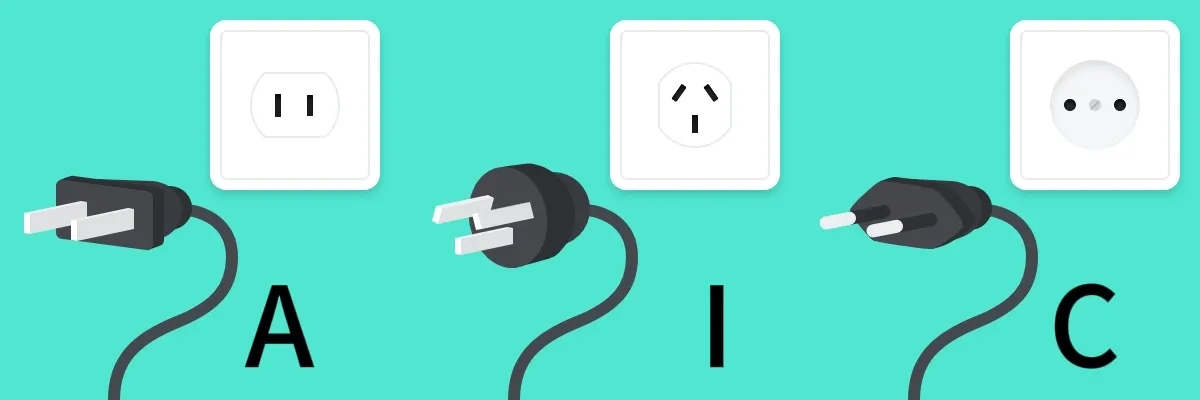
China’s electrical system includes several plug types that might be different from what travelers are used to in their home countries. In China, unique power plug types, such as Type A and Type I, are commonly used. Here's a detailed look at the plug types you will encounter in China:
Types of Plugs in China
Type A plugs consist of two flat parallel pins. They are ungrounded and commonly used in a variety of devices. This type is also prevalent in the United States and Japan, making it familiar to many international travelers. However, due to its lack of grounding, it's less suitable for high-powered appliances.
Type I plugs are characterized by three flat pins arranged in a triangular pattern, and this design includes a grounding pin, which makes it safer for handling higher voltages or more sensitive electronic equipment. This type is similar to the standard used in Australia, New Zealand, and some other Pacific countries. It's typically found in newer constructions and modernized areas in China, providing a safer electrical connection for a variety of devices, including laptops, phone chargers, and kitchen appliances.
Type C plugs come with two round pins and are one of the oldest types still in use. They are found predominantly in older infrastructure and are also very common across Europe, which makes them recognizable to many European tourists visiting China. However, like Type A, these are also ungrounded and generally used for lower power devices.
Standard Socket in China

In China, wall sockets can accommodate various plug types.
The upper part of the socket usually accommodates two flat pins or two round pins, which are common for Type A and Type C plugs, respectively. These designs are suitable for a variety of devices from different regions, particularly those used in Europe and North America.
The lower part of the socket includes an earthed configuration with three flat pins in a triangular layout, designed for Type I plugs. This setup allows for safe and flexible usage across a wide range of electronic devices, from smartphones to kitchen appliances.
Travel Adapters in China

Source from Amazon
When preparing for travel to China, it's essential to understand the role and functionality of travel adapters, as well as where to obtain them and their cost.
Function of Travel Adapters
Travel adapters are crucial for connecting devices from different countries to the electrical outlets in China, which mainly use types A, C, and I plugs operating at 220V and 50Hz. It's important to note that adapters do not change the voltage of the electricity supplied to your device; they merely allow the plug to fit into the foreign socket. Therefore, if your device doesn't support the local voltage (220V), you'll need a voltage converter or transformer to prevent damage.
Where to Buy Various Types of Adapters
Travel adapters can be readily purchased in the US from a variety of stores and online platforms such as Amazon, Best Buy, and specialized travel gear websites like Going In Style. Prices vary depending on the type and functionality, ranging from simple one-port models starting around $9.99 to more sophisticated options with multiple ports and built-in surge protection costing up to $40.
- Simple adapters are typically affordable, with prices starting at about $9.99. These are suitable for travelers who need minimal connectivity for devices like mobile phones and cameras.
- Multi-port adapters offer more functionality, allowing you to charge multiple devices simultaneously. These are particularly useful for families or tech-heavy travelers and generally cost between $20 to $40, depending on the number of ports and additional features like USB ports and surge protection.
- All-in-one adapters , which come with various plug types and may include voltage conversion capabilities, are at the higher end of the price spectrum but offer the most versatility. They are ideal for travelers visiting multiple countries or those needing to connect several types of devices.
How to Use Travel Adapters
To use a travel adapter, simply plug your device’s charger into the adapter and then plug the adapter into the wall socket in China. Make sure any switch on the adapter is turned to the correct setting if it includes voltage conversion options. Always double-check that your device is compatible with the voltage supplied by the outlet, especially if using a simple adapter without conversion capabilities.
Safety and Compatibility
It’s also wise to consider the safety of the adapter you choose. Many come with built-in protections against overcurrent and short circuits, which are vital for protecting your devices. Before purchasing an adapter, ensure it is compatible with the plug types used in China and meets your device's power requirements.
By understanding these key aspects and preparing accordingly, you can ensure that all your electronic devices are charged and ready to use throughout your trip to China, avoiding any potential inconvenience or damage to your devices.
Voltage Converters or Transformers in China

If your device only supports a single voltage (e.g., 110V) which is common in countries like the USA, and you plan to use it in China where the standard voltage is 220V, you will require a voltage converter or transformer. This is especially important for high-wattage appliances such as hair dryers or irons, which may not support dual-voltage options.
Choosing the right converter involves checking the wattage and voltage requirements of your device to ensure compatibility. It’s recommended to consult the device’s manufacturer or an expert to choose the appropriate converter or transformer, ensuring both safety and functionality of your devices in China.
When packing for China, make sure to consider these adapters and converters as essential items in your travel kit to avoid any inconvenience during your stay.
Do I Need a Transformer in China?
Understanding whether you need a transformer to safely charge your devices in China is essential, especially since China's standard voltage is 220V with a frequency of 50Hz. This differs from many other countries and can pose a risk to devices not designed for these specifications.
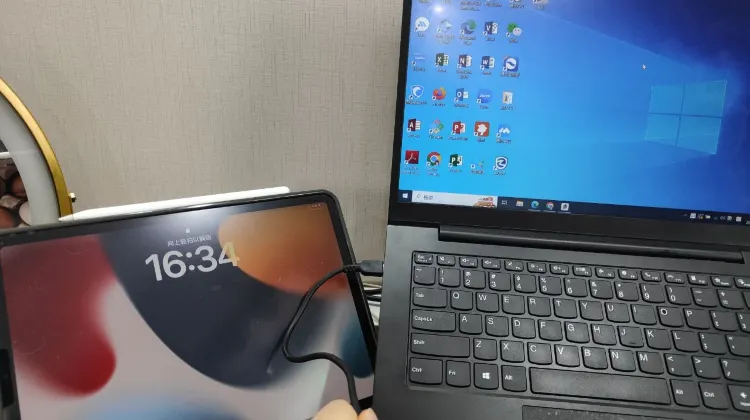
Charging Laptops in China
For laptop computers, most modern models are equipped with chargers that support a range of voltages from 100V to 240V. This flexibility means that you typically do not need a transformer to charge your laptop in China. However, it is always prudent to check the specifications on your particular charger. If it falls within this voltage range, you can safely charge your laptop using just a plug adapter to fit the local socket types (Type A, C, or I).
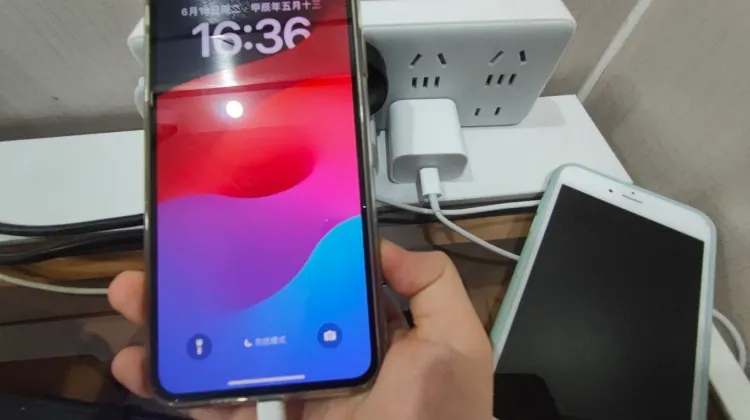
Charging Smartphones in China
Similarly, smartphone chargers are generally designed to accommodate a wide range of voltages, typically from 100V to 240V. Before using your charger in China, verify the voltage specifications listed on the device. If it states "100~240V," you can charge your smartphone without a transformer. Again, you may need a plug adapter to match the Chinese socket type.

Charging High-Power Appliances
High-power appliances such as hair dryers and curling irons often require more specific voltage settings and may not support dual voltage. These devices usually draw a lot of power (600W to 1200W), and using them with a voltage not suited to their design can be hazardous. If your hair dryer or curling iron is not rated for 220V, you will need a transformer capable of handling significantly higher power levels—up to 2 to 3 times the device's wattage—to ensure safe operation.
For such high-power appliances, it's advisable to either bring devices that are rated for international travel (220V compatibility) or consider renting them locally at your destination, such as from a hotel, to avoid the risks and inconveniences associated with using transformers.
What Voltage is Used in China?

China operates on a 220V voltage supply and a frequency of 50Hz . This is consistent across the country, whether in urban or rural areas. China mainland uses generally 220V, 50HZ, AC (Hong Kong is 220V; Taiwan is 110V).
Devices designed for 220V use will function properly in China. However, if your device is configured for a different voltage, such as 110V which is common in the United States and Japan, you will need a voltage converter or a dual-voltage rated device to safely use your electronics.
How Voltage Differences Affect Devices
Devices are generally designed to operate at a specific voltage and frequency. If a device is plugged into a voltage supply that it was not designed for, several issues can occur:
- Lower Voltage : If the voltage of the power supply is lower than what the device requires, the device may operate slowly or not at all. It might also behave unpredictably or simply fail to function.
- Higher Voltage : Connecting a device to a higher voltage than it’s designed for can cause serious damage. The device may overheat, leading to potential fire hazards or permanent damage.
【Precautions and Solutions】
To avoid these issues, travelers should:
- Check the voltage and frequency specifications on their devices before traveling.
- Use a voltage converter if their device does not match the destination’s voltage.
- Consider purchasing universal or dual-voltage devices for frequent travel.
Global Electrical Standards Overview
Globally, there are three main electrical standards for devices: 110-120V used primarily in North and Central America, 220-240V prevalent in Europe, Asia, and Oceania, and the dual-voltage system. These standards also differ in frequency, either 50 Hz or 60 Hz, and include a variety of plug types specific to each region. Understanding these differences is essential for safely using electronic devices while traveling internationally.
Asia & Oceania Electrical Standards
North america & south america electrical standards, europe electrical standards, oceania electrical standards, where to charge easily in china.

China offers numerous convenient charging options across various public locations, often for free. However, some places might require you to rent a portable charger or power bank. Here’s where you can typically charge your devices:
- Cafés and Restaurants : Many dining establishments in China provide charging points near seating areas, allowing patrons to recharge their devices while enjoying a meal or coffee.
- Libraries and Shopping Malls : These public spaces often have dedicated areas where you can charge devices. Libraries are a quiet option, while shopping malls provide charging stations amidst your shopping experience.
- Public Transport : In major cities, modes of public transportation like metro trains and buses may offer charging ports or stations, especially in newer or recently refurbished vehicles.
- Airports : Major Chinese airports, including Beijing Capital International Airport and Shanghai Pudong International Airport, are equipped with numerous charging stations in the terminal areas. These are especially useful for travelers looking to charge their devices before a long flight or during layovers.
Charging Without a Wall Socket in China

In China, where access to a traditional wall socket may not always be possible or convenient, there are several alternative charging methods that travelers can use to keep their electronic devices powered. Here are detailed and practical ways to charge your devices without relying on direct access to wall sockets:
- USB Charging : Most modern devices, including smartphones and tablets, can be charged using USB cables. In China, USB charging ports are commonly available in public places such as airports, cafes, and on public transport. These USB ports can often be found integrated into seating areas or digital kiosks.
- Portable Power Banks : Power banks are a versatile and mobile charging solution. They are widely available for purchase at electronics stores, convenience stores, or online platforms within China. Power banks come in various capacities, allowing you to charge anything from smartphones to laptops. It’s advisable to invest in a high-capacity power bank if you plan to be on the move frequently.
- Battery Packs for Rent (充电宝租借) : In China, renting portable battery packs from automated kiosks is a popular and convenient option. These kiosks are commonly found in high-traffic areas like shopping malls, tourist spots, and transport hubs. Users can rent a power bank, use it for as long as needed, and then return it to any kiosk across the city. This service usually requires a mobile app and payment method, which might need some setup for international travelers.
- Solar Chargers : For travelers exploring rural or outdoor areas in China, solar chargers offer a sustainable way to charge devices. These portable solar panels can charge devices directly when exposed to sunlight, making them ideal for hiking or camping trips.
- Wireless Charging : As wireless charging technology becomes more widespread, spots offering wireless charging pads are appearing in more locations, including cafes and hotels. Devices that support wireless charging can be powered up by simply placing them on a charging pad, which might be provided as a complimentary service.
- Vehicle Chargers : If you are traveling by car or renting a vehicle, using a car charger can be an effective way to keep your devices charged. Most modern vehicles feature USB ports that support device charging directly from the vehicle’s power system.
China Plug Guide
- 1. Types of Power Plug Used in China
- 2. Standard Socket in China
- 3. Travel Adapters in China
- 4. Voltage Converters or Transformers in China
- 5. Do I Need a Transformer in China?
- 6. What Voltage is Used in China?
- 7. How Voltage Differences Affect Devices
- 8. Global Electrical Standards Overview
- 9. Where to Charge Easily in China
- 10. Charging Without a Wall Socket in China
<h3>Trending Searches</h3>
Popular Content
- trip to Jaipur cost
- trip to Lakshadweep cost
- Trip to Anguilla cost
- Trip to Colombia cost
- trip to greece cost
- things to do in chicago
- Trip to Seychelles cost
- trip to Iceland cost
- Trip to Ecuador cost
- Trip to U.S. Virgin Islands cost
- Trip to Chile cost
Popular Attractions
- Shanghai Disneyland Tickets
- california disneyland
- blizzard beach water park
- typhoon lagoon water park
- Andamanda Phuket Waterpark
- Sky Zone Trampoline Park
- Arc de Triomphe
- Lingering Garden
- Lotte World Adventure
- Victoria Park
- Guanyin Temple
- Day Tour Nikko
- Day Tour Milan
- London Dungeon
- Day Tour Osaka
- eSIM Singapore
Connectivity
- Indonesia SIM Card
- How to Activate eSIM on iPhone
- Hong Kong eSIM 1 Day
- China eSIM 1 Day
- eSIM Vietnam
- Thailand SIM Card
- Switzerland eSIM
Getting Around
- Haruka Express
- Tokyo Transportation
- JR pass airport transfer
- Eurail Pass Discount
- Japan Transport App
- Keisei Skyliner
- Customer Support
- Service Guarantee
- More Service Info
- Website Feedback
- About Trip.com
- Terms & Conditions
- Privacy Statement
- About Trip.com Group
Other Services
- Investor Relations
- Affiliate Program
- List Your Property
- Become a Supplier
Nvidia is throwing its weight around — and even Amazon is bowing down
Housing is now 'impossibly unaffordable' in these 4 cities — and they're all in the same state, elon musk says he wants optimus to be a 'good looking robot' that people think of as a friend, dollar tree fails to remove lead-tainted apple sauce after recall, fda says, the curious case of reddit's surging traffic, almost half of dell's full-time us workforce has rejected the company's return-to-office push, chipotle is selling 'chipotle boy' bowls aimed at finance bros, the 7 best portable air conditioners for staying cool during summer heat waves.
Millennials are losing their cool
A Google strategy manager says these are the 5 things you should do to stand out in the workplace
Melinda French Gates said she loves her new neighborhood, having moved from ex-husband Bill Gates' $183 million compound
Home prices are falling in these 2 states with too many houses and not enough buyers
Businesses are rushing to use generative AI. Now comes the messy part.
A lawyer dreamed of disrupting the legal industry with private equity. It turned into a nightmare.
The Caitlin Clark culture war sums up our garbage treatment of female athletes
We take you inside the companies and the topics that matter to you.

Sign up to get the inside scoop on today’s biggest stories in markets, tech, and business — delivered daily. Read preview
By clicking “Sign Up”, you accept our Terms of Service and Privacy Policy . You can opt-out at any time by visiting our Preferences page or by clicking "unsubscribe" at the bottom of the email.
New Episodes This Week
I toured the most expensive, $17,000-per-person suite on Silversea's new ultra-luxury cruise ship — see inside
17 celebrities who have left Los Angeles on where they moved and why they did it
Americans are just about failing when it comes to nutrition, says a food-as-medicine researcher. A few simple diet tweaks could help.
A cardiologist shares 1 simple change you can make to your diet to protect your heart health
I spent every summer in Greece as a kid. Here are 7 places to visit that aren't Santorini, Mykonos, or Athens.
A stock market correction is coming as rates, inflation, and valuations darken the outlook for investors, strategist says, most popular.
- Main content
Home » News & Insights » China Unleashed: Sabre reveals key outbound Chinese travel insights for 2024
China Unleashed: Sabre reveals key outbound Chinese travel insights for 2024
The travel industry has been waiting. Waiting for Chinese travelers to return to the global tourism stage in a significant way. While there was some recovery in 2023, outbound travel from China remained largely in the role of supporting actor rather than the main character. Now that we’re well into 2024, that is changing.
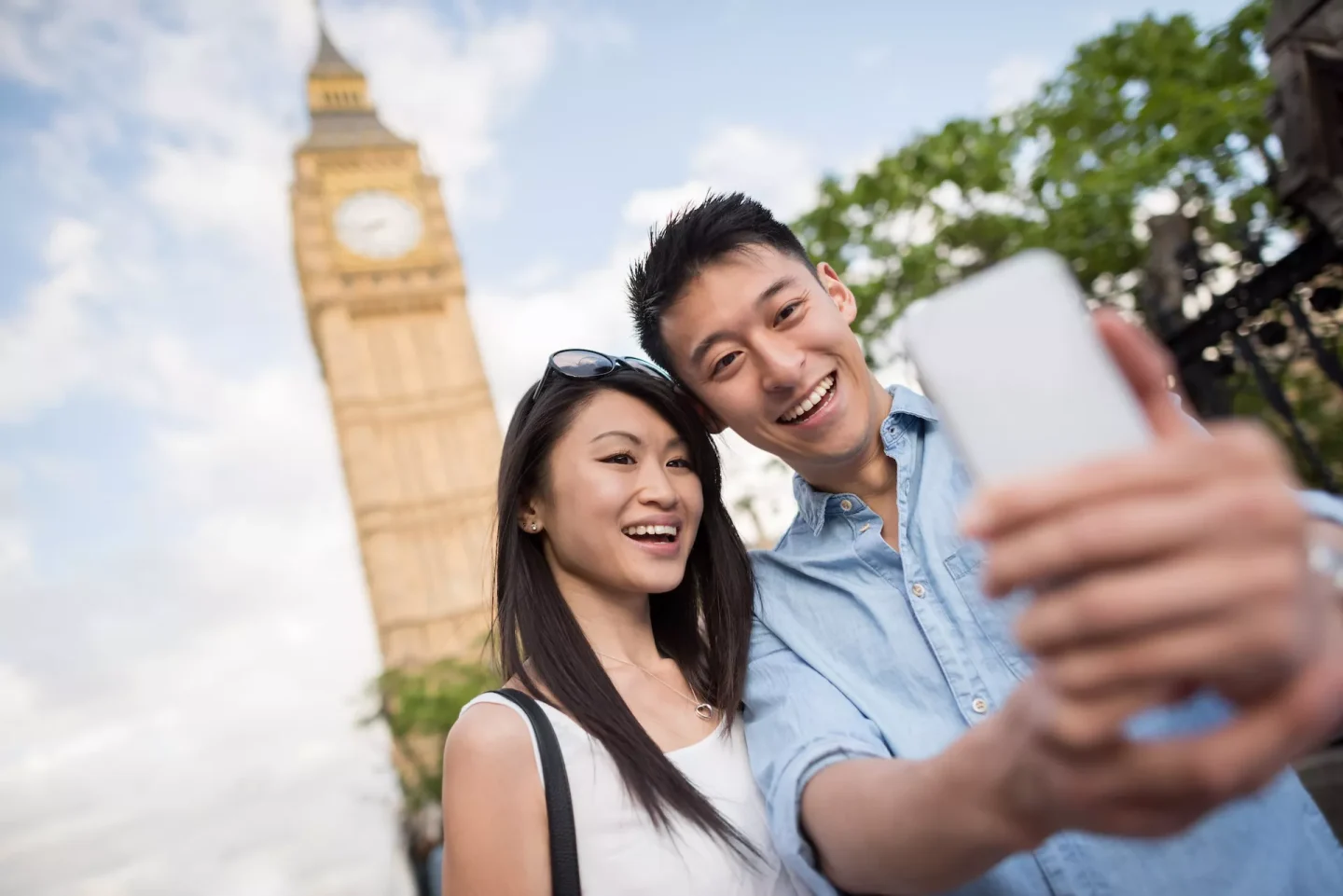
- Share on Facebook
- Share on Twitter
- Share on LinkedIn
With Chinese travelers showing clear demand and confidence in global travel for 2024, the tourism industry is surely delighted they have regained their main character energy and are ready to explore the world again.
Sabre has taken a deep dive into latest travel trends and trips booked from mainland China in our new report China Unleashed , which looks at whether the wait is truly over, whether Chinese travelers are back traveling the world in large numbers, and if their travel habits are changing. Our analysis looks at trips booked (up to March 31, 2024), for travel during 2024.
Our key findings include:
- Travel originating from mainland China has increased by close to 400% overall globally for 2024, with some destinations seeing surges of more than 2,000%;
- Chinese travelers are taking advantage of reciprocal visa-free agreements with countries around the world, but they aren’t limiting where they travel;
- Airfare prices are down, making travel more affordable for Chinese travelers;
- Fastest growing routes globally for Chinese travelers in 2024 include Macao, Australia, Japan, Russia, and Bangladesh.
- Chinese travelers are once again embracing Business Class travel, and demand for Premium Economy travel is increasing;
- Outbound airline capacity is up by more than 3000% on some routes as airlines look to meet demand.
What does this mean for the travel industry?
When you consider that Chinese travelers are renowned as big spenders – making 155 million international trips and collectively spending some $245 billion pre-pandemic – it’s certainly heartening to see there is a significant appetite for outbound travel from mainland China in 2024.
There are significant peaks during the year which surpass pre-pandemic travel booked, or come close. During Chinese New Year, for example, travel booked from mainland China to other countries in the Asia Pacific region was at 106% of 2019 levels. Meanwhile, there is also strong demand for travel during the fourth quarter of 2024, driven in part by the upcoming Golden Week holiday, with Chinese travelers confident to book well in advance for later in the year. According to the China Tourism Academy , the number of outbound trips from China will reach 130 million during 2024.
The number of outbound trips from China will reach 130 million during 2024
So, while 2023 was the year of re-opening for China, 2024 is the year Chinese travelers are really embracing global travel again in significant numbers.
What’s important now
The travel industry needs to ensure it can deeply understand what travelers from China want, where they want to go, how they want to get there, and the experiences they want to have when they reach their destination.
Those who really make the time and investment to understand and deliver these needs will be the ones who win the hearts, minds, and spending power of Chinese travellers in 2024, and into the future. When you consider that only around 13% of Chinese citizens currently have passports, but increasing numbers are applying for a passport with each passing year, the importance of Chinese travelers for all sectors of the tourism industry can only increase.
Data sources: Sabre Market Intelligence MIDT, Sabre Market Intelligence Ticketing, OAG Air Capacity, Sabre Market Intelligence Global Demand (all data up to March 31, 2024).
Download the report
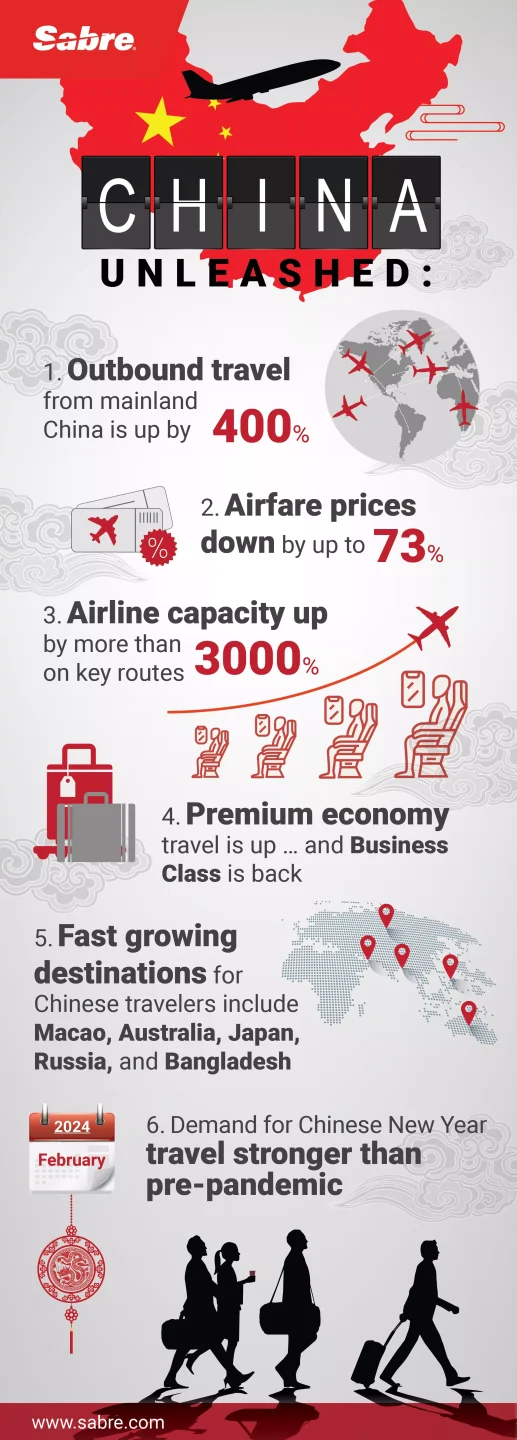
Related Post
Sorry, no post were found at this time.
Unsupported browser detected, for a better experience please upate to a newer version of Internet Explorer.

IMAGES
VIDEO
COMMENTS
Here are some phrases you can use: 祝你一路平安 (zhù nǐ yī lù píng ān) This phrase is a traditional and formal way to wish someone a safe journey. It translates directly to "Wishing you a safe journey.". Example: If your friend is about to embark on a trip, you can say, "祝你一路平安" before they leave. 旅途愉快 ...
一路平安 (yí lù píng ān): Another common expression used to wish someone a safe trip is "一路平安.". It directly translates to "have a safe journey throughout" and conveys the desire for a secure and trouble-free travel experience. 一路顺利 (yí lù shùn lì): If you want to wish someone a successful and safe journey ...
This expanded list of 30 essential Chinese phrases covers a broad range of situations, making your travels through China or any Chinese-speaking region smoother and more enjoyable. Remember, a little language preparation goes a long way in enhancing your travel experience and creating meaningful interactions.
Generally speaking, China is a safe country to travel around, and most people you meet are friendly, honest, and trustworthy. However, China is far from immune to crime, the weather can affect travel plans, there are some health risks that may be new to you, and accidents do happen. China Travel General Information
This expression is particularly popular in Mainland China. "Text me once you arrive safely! 一路顺风!". Translation: "Text me once you arrive safely! Have a smooth journey!". 2. 旅途愉快 (lǚ tú yú kuài) This informal expression translates to "have a pleasant journey" and can be used to wish someone well before their flight.
yílù píngān. Literal meaning: Whole Way Peace. To wish somebody a safe and pleasant journey, that everything may go well. This phrase should be fail-safe. It can be used in any situation where someone is parting with you. Check out these groups of Chinese phrases too. You might find more useful Mandarin phrases.
After China removed most of its COVID-related cross-border travel restrictions, foreign tourists are slowly returning. ... the reality is that China is an extremely safe destination, with friendly ...
Pinyin: wǒ yù dìng le liǎng jiān ___. English: I have made a reservation for two ___ rooms. You can obviously replace the number of rooms with however many you booked. To indicate the type of room, fill in the blank with one of the following: 标准房 (biāo zhǔn fáng) — Standard room. 套房 (tào fáng) — Suite.
China Travel Restrictions & Travel Advisory (Updated June 17, 2024) Visa-Free Access to China: If you're from France, Germany, Italy, the Netherlands, Spain, Austria, Belgium, Hungary, Ireland, Luxembourg, Switzerland, and Malaysia, you can visit China visa-free for 15 days until December 31st, 2025. If you're from Singapore, you can relish ...
Berkshire Hathaway Travel Protection ranks China middle-of-the-pack - 21st out of 42 countries - in its annual Safest Places ratings. In the BHTP research, assessments of China's safety vary greatly by demographic group. Millennials and LGBTQ+ travelers are more likely to think China is safe, while older travelers are less likely to share ...
OVERALL RISK: MEDIUM. Overall, China is safe to travel to, but crime rates vary depending on the area of the country. Some cities are very safe, while in some there are areas that are best avoided, but in general, you should be wary of petty theft and look closely after your belongings which will minimize the chances of anything going wrong.
The phrase to wish someone a safe flight in Chinese is "Nín hǎo yí bēi," which translates to "Have a safe trip.". This phrase is used to wish someone a safe flight, and can be used for anyone who is planning a long journey, whether it is by car, train, or plane. This phrase can be used by someone who is about to embark on a trip, as ...
According to Numbeo, which gathers data for public surveys, China scores a 20.21 on the crime index, which is a low value. People report low concern levels about all types of crime, from petty theft to assault. China's crime levels were fairly low to begin with, and the prognosis is even more optimistic.
China alone contributed 51% of the travel and tourism GDP in the Asia-Pacific region in 2018, according to the World Travel and Tourism Council. And Chinese travelers typically accounted for 30% ...
Other countries, such as Canada and Australia, have a lower level of advice, which is to "exercise a high degree of caution". It's such a shame that the USA and China aren't getting along at the moment. 5. Get a VPN before you leave. You need a VPN if you want to use hotel Wi-Fi. Image by Privecstasy on Unsplash.
9 important safety tips for China. 1. Dealing with crowds. Almost 1.4 billion people call China home, so get ready to rethink your boundaries around personal space. Elbowing, pushing and cutting in line can be confronting to visitors, but try to accept it as part of the Chinese experience.
China is generally a safe country to travel to, as long as you know where you're going and stay alert. China is visited by travelers from all around the world, and is of no danger to any person who understands local cultures and obeys local laws. In saying this, China's government does keep quite a tight lid on foreign influences, such as ...
It's extremely rare for travelers to come into any problems with physical safety in China. Safety issues while traveling in China usually end up being petty thievery, like pick-pocketing, and maybe some issues with travel sickness. Regardless of China's safe reputation, travelers should still be appropriately careful, especially female travelers.
10 Safest Cities in China. The following are ten of the safest places to go in China, according to their crime and safety indices. Beijing, China. 1. Beijing. There are really too many things to do and see in Beijing, including The Great Wall, The Summer Palace, The Ming Tombs, museums, zoos, parks, canyons, and more.
Below are some tips to help you stay safe while traveling in China. 1. Avoid confrontations. Chinese people generally avoid confrontation, but fights can happen and it is important to avoid getting involved in any sort of physical confrontation with locals. This is a rule that applies to pretty much any country, including China.
According to the U.S. Department of State, traveling to China is under a level 3 travel advisory, warning Americans to reconsider. The State Department has four warning levels. The fourth is "Do ...
Discover the ultimate guide on solo travel to China! Uncover valuable insights and expert tips on safety, cultural nuances, and must-know precautions for those exploring the wonders of China alone. Plan your journey with confidence and make the most of your solo adventure. Your safety should be a priority - learn why China is a fantastic destination for solo travelers.
The department issues advisories that classify how safe a place is to travel on a given moment. Each country has an advisory level from 1 to 4, from lowest risk to highest risk.
Cases of a dangerous and highly fatal bacterial infection have reached record levels in Japan, official figures show, with experts so far unable to pinpoint the reason for the rise.
Safety is top of mind for 2024 travelers, and these 15 countries have been ranked the safest destinations. ... To help, travel insurance provider Berkshire Hathaway Travel Protection just released ...
Research Your Destination. Customs and norms in other countries can be very different from those in the United States. Check out our Country Information pages to find specific information for every country in the world. You'll get info on visa requirements, safety and security conditions, crime, health and medical considerations, local laws, areas to avoid, and more.
This setup allows for safe and flexible usage across a wide range of electronic devices, from smartphones to kitchen appliances. Travel Adapters in China. Source from Amazon. When preparing for travel to China, it's essential to understand the role and functionality of travel adapters, as well as where to obtain them and their cost. Function of ...
Business Insider tells the global tech, finance, stock market, media, economy, lifestyle, real estate, AI and innovative stories you want to know.
Sabre has taken a deep dive into latest travel trends and trips booked from mainland China in our new report China Unleashed, which looks at whether the wait is truly over, whether Chinese travelers are back traveling the world in large numbers, and if their travel habits are changing.Our analysis looks at trips booked (up to March 31, 2024), for travel during 2024.
There is no open information on the actual number of people in China who have had travel constraints placed upon them, but they belong to a group of 167 million people who work at non-private ...